#they’ve (the US gov) made it very clear that this was going to happen no matter what
Explore tagged Tumblr posts
Text
For the people who keep saying “it’s not like it’s gotten better in the last 4 years” you’re forgetting that Congress changed hands because we lost seats in 2022, and that’s when shit started well and truly going down hill (I know it wasn’t going well, but it went from a slow descent to a sharp drop). I know it’s scraping the bottom of the barrel, I know the bar is in hell, but I don’t think most of the people saying this are thinking about how much worse of a place we could be in right now. When half the country is white nationalists and some of the highest ranking congress members are proud nationalists, it’s going to take a hell of a lot more than 4 years and one president to accomplish what we want.
We’re too far down the track to fascism to turn around now, okay? We’re already on our way there. That clip of Biden from the other day is fucking vile and it made my stomach turn, but genoc*de Joe or whatever you guys are calling him now is at least slowing the fucking train down a little bit. When Bernie Sanders and Katie Porter are saying the same thing as his office, you should take that as the canary in the coal mine that it is.
A good chunk of the money is for Palestinian refugees and Ukraine, okay? That doesn’t make up for a damn thing or a single fucking missile that we’ve fired, but it’s important information to have. This situation fucking sucks. The options fucking suck. But unless a GENUINELY viable candidate shows up between now and the election, he is still the option that will do the majority of the country the least harm.
The next time you think a trumper has a point, the next time one of them says something vaguely pro Palestine or criticizes the way the Biden administration is handling this, I want you to remember that these people planned overturning roe v Wade before the 2016 election. They are playing the long game. They know how we work, they know how we think, and they know how to turn public opinion against somebody. They want us to believe that they’re dumb, but they are smart and they are good at organizing.
Look at Florida. Look at Tennessee. Look at Texas. Look at every news story of every ridiculous, horrifying law that has been proposed or passed since 2016, because that is their plan for the country. Every law that they’ve proposed that threatened a marginalized group? It’s a set up for it to be brought before the Supreme Court. It’s exactly how Roe v Wade got overturned.
I don’t have any good answers for anyone. Nothing about this is good. But I am fucking begging you to take half a step back and look at the big picture & remember the last ten years & to not fucking fall for it because they are playing y’all like a fiddle.
sorry but i want to hit every american talking about not wanting to vote democrat anymore with hammers. lol
#like I understand and that clip from the other day did give me a very very long pause#but unless another genuinely viable candidate comes up in between now and the election…… I don’t know what else to do#they’ve (the US gov) made it very clear that this was going to happen no matter what#we were always going to be on this side#and some of that money is going to Palestinian refugees and Ukraine and I just.#I’m nauseous but I don’t know what else to do the other option is to expedite the fascism train we’re already on#I keep seeing people say that nothing’s gotten better in the last 4 years but Christ you guys are forgetting how much worse it could be#domestically. it hasn’t gotten better because smaller electronics were won by republicans. Congress changed hands. it’s state laws that are#getting worse and the Supreme Court is a whole other can of worms and I am just drowning in grief and uncertainty#like the rest of us are and i would never tell anyone else what to do here but I don’t know what else to do#I hope that another GENUINELY viable candidate comes up but I don’t think they will. that’s a big ask for how far away it is.#not even thinking about project whatever just… fuck we’re too deep on the road to fascism what the fuck is going to happen#if we don’t vote for the guy who’s at least slowing it down a little bit#I just. don’t have the emotional bandwidth to have these conversations with people irl#politics tag#personal#[screams into a pillow] EVERYTHING IS TERRIBLE I DON’T KNOW WHAT TO DO
38K notes
·
View notes
Text
FTWD 6x11: The Holding
Wow! Where to begin with this episode? We had some super-stellar parallels going here. I don’t think it was any secret that I wasn’t thrilled with last week’s episode. It was fine, but also kind of meh. I LOVED this week’s episode. So much good stuff!
***As always, spoilers for 6x11 abound below. Don't read until you've watched!***
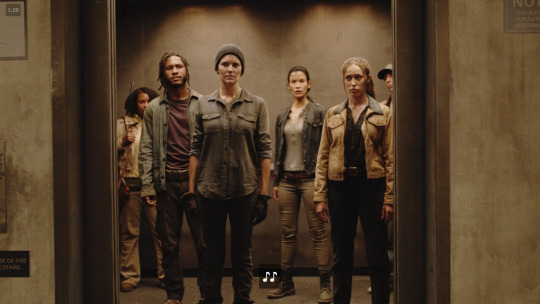
So, we learn about these “end is the beginning” people. They’re staying in a place called The Holding, which is really an underground parking garage. (Um…cars, anyone? Let’s recall that Daryl and Carol walked through at least one parking garage in Consumed while looking for Beth. They also passed lots of above-ground ones, including one that had a red car with its door open in front of it. Also, the fact that it’s underground could make it a symbolic tomb/grave.)
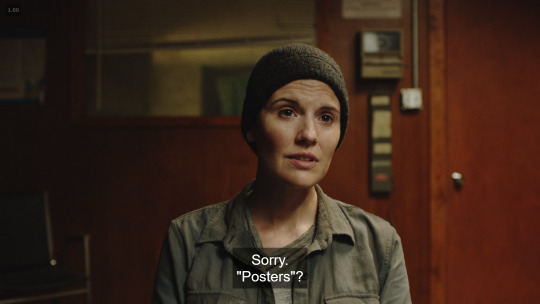
These people are composting walkers to grow food underground. (People do use blood and bone feed to fertilize gardens. Like compost and waste, it really does help them grow. Of course in our society it’s ANIMAL blood and bone. Using walkers/humans is definitely more sinister and cringy. And they have proven that eating various parts of humans leads to things like Mad Cow’s Disease, so I do think Alicia’s question about food being grown that way being healthy is viable.)
But moving on.
It’s important to note that the showrunner called this group a cult, so are not they meant to be “good people.” Most of those that live there aren’t sinister, but they’ve been brainwashed into thinking their leader is a good man and that what he’s trying to accomplish is good. They’ve drunk the koolaid (or eaten the walker food?).
So, we have the ivy walker.

There really couldn’t be a more clear parallel to the blond girl Daryl saw on the tree in 5x15. Plus all the green ivy around her.
I believe we saw a promo of this walker early on. Like maybe nearer the beginning of S6. Which, thanks to Covid, was more than a year ago. I’d pretty much forgotten it, but we actually do see it in this episode.
The dogma of this group (“the end is the beginning”) is that from death springs new life. This walker is meant to represent that. Life growing out of death. And on its own, it doesn’t seem like an overly negative mission statement. After all, this world is full of death and people are trying to survive. But it quickly becomes obvious that there’s more sinister stuff at work here.
So what does this have to do with Beth? I think she’s the ultimate symbol of life springing from death. So, not only does this foreshadow her, but they’re also using her as a symbol here. I don’t know how this group may feed into future story lines, or if they’ll just be a FTWD thing, but it will be interesting to watch.
Some of the major things in this episode: a Sirius reunion, a Daryl/Merle parallel, Grady parallels, at least two major Beth/Bethyl proxies, and some tantalizing hints for what’s to come involving both this group and the CRM. (See why I loved this episode?)
Let’s dive in.
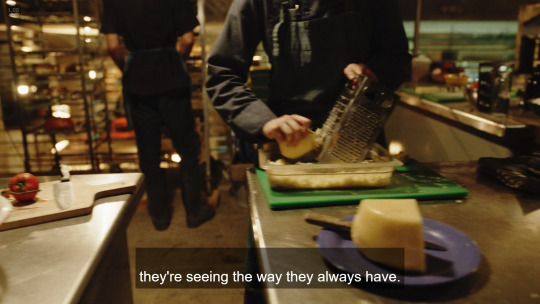
First, let me acknowledge all the background symbols. There are tons of them, and I don’t want to go into tons of detail about them. But we see cheese (think Morgan/Eastman), tomatoes, eggs (lots of food). We also see fire extinguishers, lots of green (especially paint), an elevator. You get the idea.
The first big thing that happens is Wes meets his brother, Derek, whom he thought was dead.
Welcome to the first Beth proxy.
Okay, I didn’t remember much of this backstory or how much of it was told when we first met Wes. I do remember talking about his brother as a possible Beth proxy, but beyond that, I didn’t remember details. But they rehash it all here. Care to take a guess?
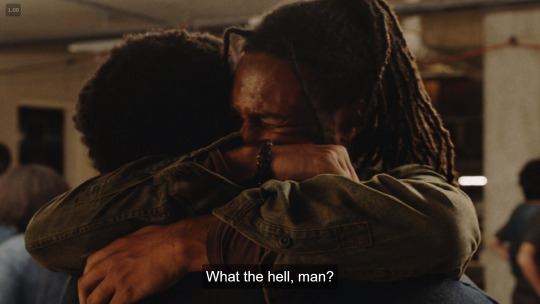
Wes went out for supplies and was overwhelmed by, you guessed it, a walker horde. He ran into a shed but it collapsed (becoming something of tomb) and the walkers were beating on the outside, trying to get in (think Beth and Daryl in the trunk). He passed out and woke up in The Holding.
That’s exactly like what happened with Beth, actually. She told Gorman she was fighting a walker and everything went black. She woke up at Grady.
The difference here is that Beth never bought into what Dawn was peddling, but unfortunately, Wes’s brother did. We eventually learn that he’s a true follower of “Teddy,” the cult leader and condones the murder that’s being done.
And of course that’s also what we think happened during the missing 17 days. Overwhelmed by walkers, left behind. Perhaps she woke up back at Grady, or somewhere else.
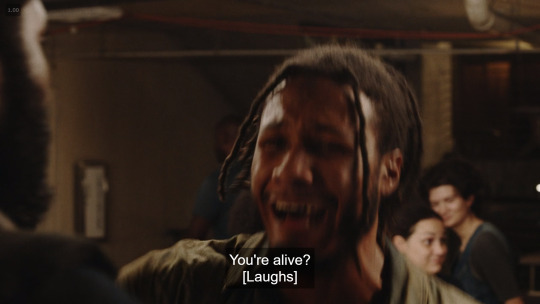
But the actual reunion between Wes and Derek is very on-the-nose. Because Wes truly thought this brother dead, he even says things like, “You’re alive?” and “What the hell?” Probably things that will be said about Beth when she finally shows up.
There’s also a serious/Sirius mention when they sit down to talk. And Derek keeps mentioning his bike. Like Daryl, he had a bike that Wes took when he thought his brother dead. But the fact that he mentions “bikes” like five times in this conversation is important.
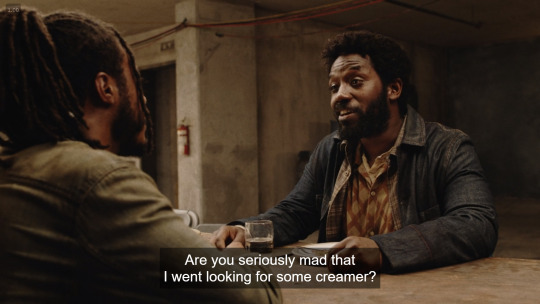
I wanted to mention coffee. We’ve seen coffee as a symbol before, specifically around Carol. We first noticed it when Paula told her little story about the carrot, the egg and the coffee beans going into the water in 6x13. She said the coffee beans changed the water itself. So, coffee = a catalyst for change. But this episode made me realize it’s a catalyst for a change that’s not necessarily good.
Apparently, the supplies Wes’s brother went out for was coffee creamer. The change that came was not only him being left behind and presumed dead, but changing into a person that no longer empathized with other human beings. (Correct me if I’m wrong, but didn’t we see Carol making and drinking coffee just before they went to the caverns and Connie disappeared?)
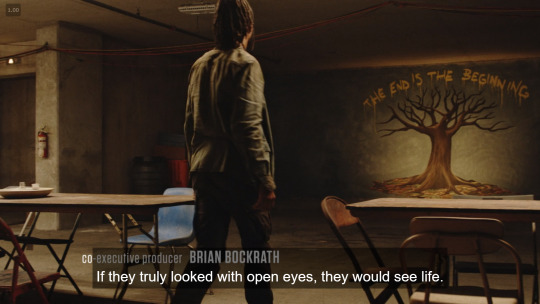
There’s also a huge eye/sight/see theme. They take everyone over to see this green-ivy walker and ask them what they “see”. The idea is that they should see life and possibility springing from death, but it’s just a way to indoctrinate them and check to see if they’re willing to go along with what the cult’s beliefs are. Lots of talk of eyes (opening your eyes), what one can and can’t yet see, etc.
Later, we see walkers with their mouths sewn shut. So we have at least the see no evil, speak no evil themes. There might have been hear no evil that I didn’t catch.
The second major parallel is to Daryl and Merle, since these two are brothers.
But it’s more than just that. Wes took Derek’s bike after he disappeared (same as Daryl and Merle). When Wes found his brother again, he was with a bad group (with Merle, it was the Governor) or rather a group of decent people led by an evil man. Derek has a skewed mindset, and is working for Teddy. Remember that Merle not only worked for the Gov but even tried to kill Michonne at one point. And how they die is…similar. Merle’s, in the end, was more chivalrous, as he died to help save Daryl and TF. That wasn’t the case with Derek, but his death resulted from him pretending to work against Teddy. Unfortunately it wasn’t real, and he betrayed them, but there are still parallels/anti-parallels between the two stories.
How is this place like Grady?
There’s the underground tomb aspect, the fact that they grow their own food. At the beginning, Alicia’s group keeps asking them questions about the community, which Riley (Nick Stahl) pretty much refuses to answer.
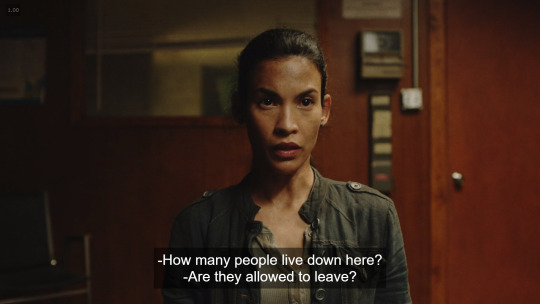
One of them is, “Are we allowed to leave?” or “Is anyone allowed to leave?” That, of course, instantly reminded me of Grady. Now, they never answer it directly, and at one point, Riley says they can decide if they want to stay or not. But by the time we get to the end of the episode, I’m pretty sure that’s BS. So, like Grady, no one’s really given the choice to leave. Even if they tell people they can.
They’re taken into a room with medical equipment at one point. It just looks a lot like Grady, though I could tell it wasn’t the same kind of medical equipment. We’re told that it’s embalming equipment.
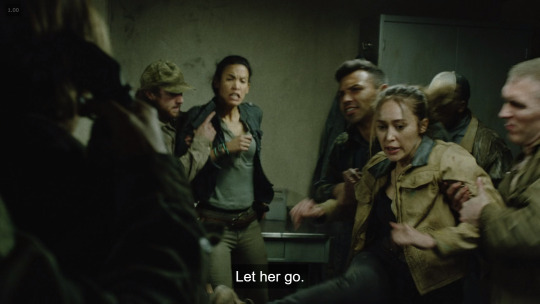
In fact, Al says something that should catch your ear. She says, “they must have hit the funeral home.” Naturally all our minds will go to Alone, but she’s talking about the funeral home she and Dwight (I think) were at before. I don’t remember which episode, but we talked about it looking a lot like the funeral home in Alone. So, I think Al is saying these people, The Holding, raided that funeral home and took the equipment. Kinda makes me think the funeral home in Alone will come back into the picture at some point.
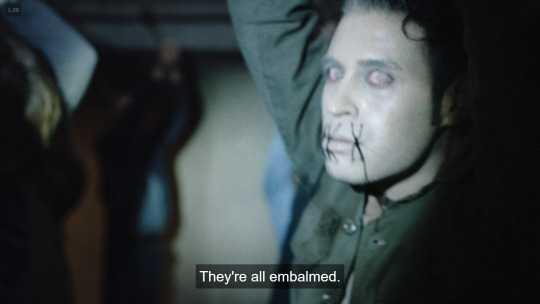
And it turns out, The Holding is embalming walkers. Al’s group ends up in a room with dozens of walkers strung up by their wrists (kind of like Daryl and Michonne were in Scars). They’ve been embalmed and their mouths have been sewn shut.
So, here’s where the plot becomes super interesting. I mentioned above that Riley told them they could choose to leave at some point, right? Al was saying that everything they’ve set up is impressive—food, power, water, they’re very self-sustaining—but it felt like they were preparing for something big.
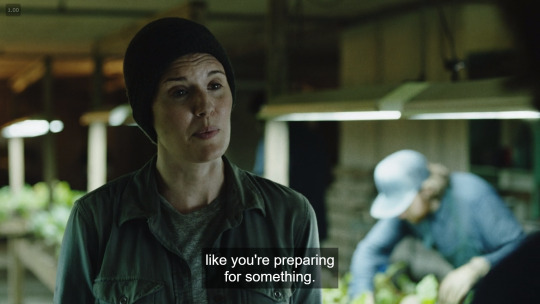
He admits that they are. He says they are planning to soon close the doors permanently. He says they never want to go topside again, and the new way to live will be underground.
Later, when talking to Morgan, Al sort of implies that maybe it’s not so much about them choosing to go underground as that something will drive them underground for a long time. Almost like they’re preparing for a nuclear winter or something. But we don’t know exactly what it is.
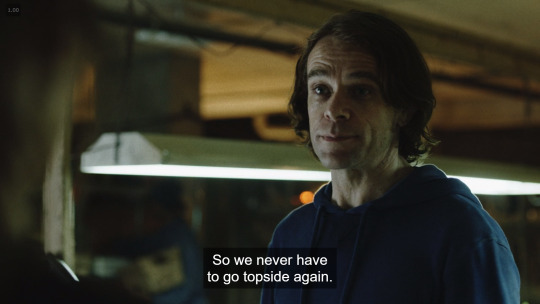
I think what we’re supposed to infer is that they’re collecting walkers to use as compost in coming years. (They even call the walkers ‘posters.) They’re embalming the walkers to keep them “fresh.” Riley says the walkers last about 2 months in the composter before they break down entirely, so putting away 20 or 30 walkers really will last them for years.
CRM Ties
Wes and Al snoop through Derek’s room. They find maps of different communities and some of those transparent overlays that have the three rings of the CRM on them. That’s how they know that this group is attacking communities (like Tank Town) and that Derek knows all about it.
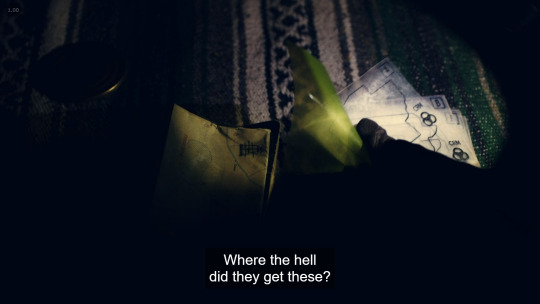
The other thing Al figures out from looking at Derek’s maps is that the group seemed to be tracking the CRM’s drop sites. She thinks they want to get their hands on a helicopter. (So, when it comes to Nora’s group, who was in the high rise, this group wasn’t after them. The roof was a helicopter drop site and that’s really who they were after. Though, they might have set the plague on Nora’s people because they are trying to kill humanity.) And given that this cult might be planning the end of the world, clearly them getting a hold of a helicopter would be a bad thing.
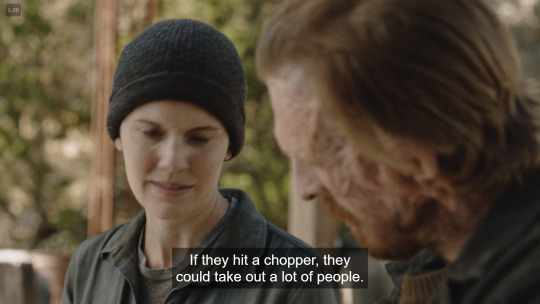
Al tells Dwight she’s going to go look for Isobel and warn her. I think she’s just planning to go to the drop sites and wait for a helicopter to show up.
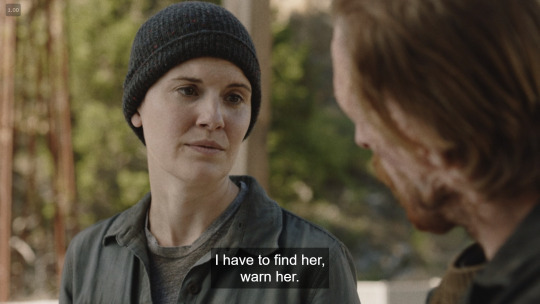
So, we have more potential interaction with the CRM through Al. And I’m really hoping we get some good Bethyl symbolism and clues through this storyline. I’ll definitely be keeping an eye on it.
Morgan and Burning it Down
Wes confronts him and talks him into leaving with them. At one point, Wes mentions Morgan. I think he just does it without thinking, because what would Morgan mean to his brother, right? But Derek instantly gets weird when he hears Morgan’s name, and Wes doesn’t really notice.
When they try to leave, they get caught, and it’s obvious Derek set them up. They’re taken to the embalming room, and Riley asks where Morgan is. They won’t say how they know him or why they want him, but they’re VERY interested in finding Morgan.
I was thinking it might just be because Morgan killed those two guys in one of the early episodes when they attacked him in his truck, but they both died and wouldn’t have known his name from that encounter anyway. So I’m not sure what this is about. There are the tapes they were leaving at gas stations and such. Maybe that’s it, but it wouldn’t explain why they would want Morgan more than the others.
They’re taken to the embalming room and threatened with death. Derek takes Wes back to the ivy walker to see if he can “see” what Wes does.
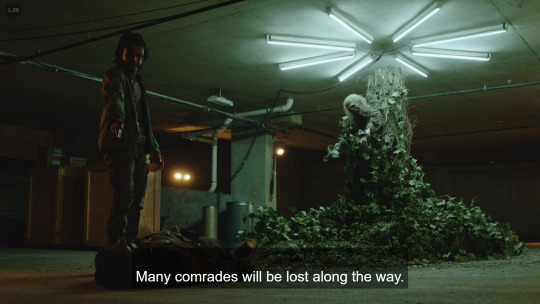
A fight ensues, and Wes throws Derek into the walker where he’s bitten. He shoots his brother so he won’t turn. The thing about this part is that it doesn’t show it. It instead shows the (somewhat yellowish) mural Derek was working on before, and Teddy’s voice is talking about how light comes from darkness. Then, we just hear a single gunshot.
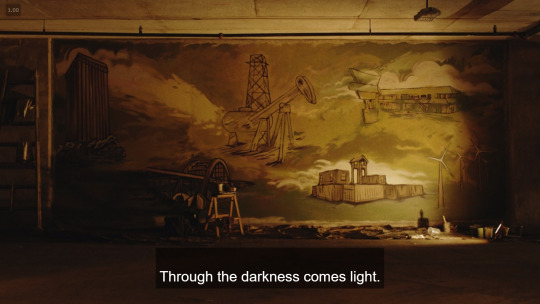
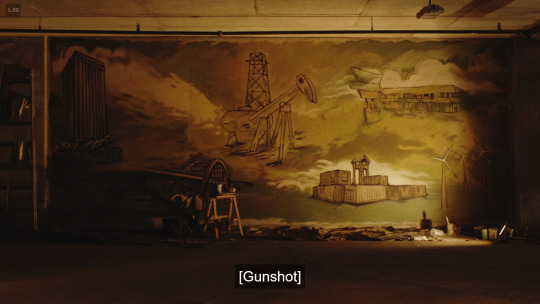
That gave me *major* Beth vibes.
Wes then goes back to the embalming room to rescue the others.
Wes’s reaction at this part reminded me a bit of Daryl/Merle too. Not so much at Merle’s death, but back in 3x10 when Daryl returned to the prison. It just struck me that, while Wes did cry when his brother died and clearly mourned him, he got over it really fast. He went back to where the group was and no longer seemed terribly broken up about it. I was just thinking he seemed to have figured out who his true family was and where he really belonged, and that that was more important than his brother’s warped mindset. Much like Daryl and Merle.
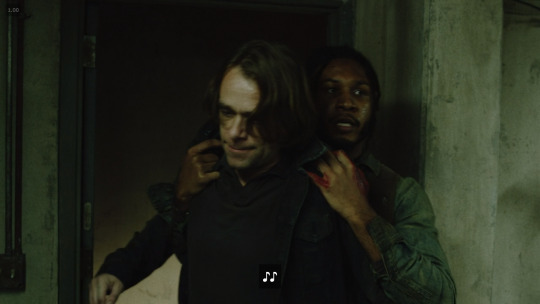
When he goes back, he takes Riley hostage briefly and they all escape into another room and bar the door. This room is full of the hanging walkers full of embalming fluid. They have to walk between them toward an exit on the far side.
Al Parallels Daryl in 5x15
Here’s another super interesting parallel. Al sees one walker hanging that has the black CRM gear on it, including the helmet, so she can’t see its face. She walks over to it and lifts its helmet, clearly looking to see if it’s Isobel, which it’s not. Such an obvious parallel to Daryl looking into the face of the blond walker on the tree. It even lunges at her and she kills it, like Daryl did with that walker.
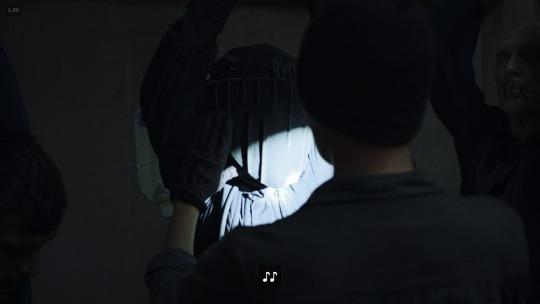
What I liked here is that Alicia freaked out about it. She said, “what the hell was that?” Aaron didn’t say that to Daryl, so they weren’t drawing as much attention to it there as they did here. But clearly we are supposed to notice that, without knowing more, that behavior is bizarre. And here, we the audience know that Al was worried it was Isobel. But Alicia doesn’t. Where the blond walker on the tree is concerned, the audience is in Alicia’s place, not being terribly clear about what’s behind Daryl’s behavior. (I mean, TD is, but most of the rest of the fandom isn’t.)

So then Alicia says they should take this place down. When Al stabbed the CRM walker in the neck, embalming fluid poured out. Embalming fluid is highly flammable. So, long story short, Alicia stays behind to “burn it down” and the others escape. (I don’t have to explain that parallel, right? ;D)
It all happens really fast. We see Alicia light the match (which Al had; just reminded me of Daryl having matches in Rick’s hallucination in 7x01, and clearly Al = Daryl in this parallel), and then it skips to Al, Wes, and Luciana back with Morgan telling him what happened. They say the fire was huge and burned hot, and Alicia could have gotten out, but they couldn’t FIND her. They also don’t know if any of the Holding people got out.
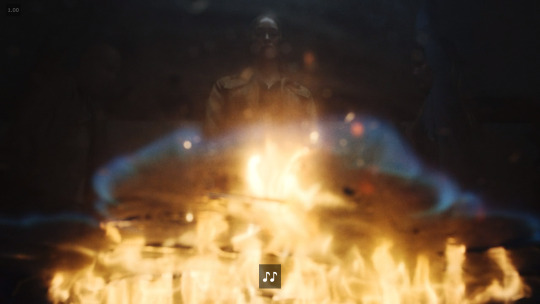
So Morgan just says they’re going to go back and start at the Holding location to look for Alicia. I’m assuming that will happen next episode.
So, we aren’t exactly clear on this group’s dogma or what they’re trying to do, but it does seem that they want to kill off everyone who lives up top. Which is, you know, everyone. And once again, that makes them a lot like the Wolves. They believe killing people is saving them. I’m not saying these are Wolves or anything (they might be; after all, both groups tied a blond walker to a tree and believed similar things about killing off the remnants of humanity) but rather that the Wolves were a foreshadow of other groups to come.
And the next question is, are they part of the CRM? Because of the CRM walker, and what they implied about them trying to hijack a helicopter, I’m thinking not. But there’s clearly a lot of entanglement going on.
Alicia = Beth
So, in the final scene, we have some interesting developments. This may be the scene that got my mind spinning the most, just in terms of symbolic Beth potential.
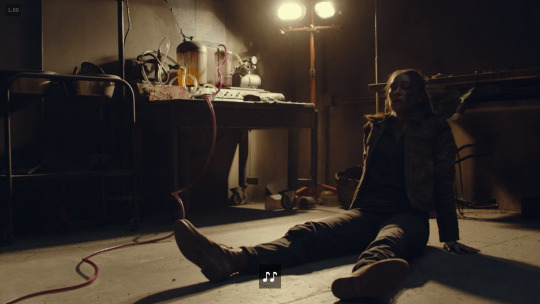
We see Alicia, very much alive, and still in the embalming room, though now all the walls look blackened. So obviously the entire place didn’t burn down. (That doesn’t surprise me. It’s an underground parking garage. It takes a lot to burn down cement.)
She’s being held hostage in there. Riley comes in and says some weird, cryptic things. He says new life springs from death, for MOST people, and that they plan to preserve Alicia exactly as she is. It’s obvious they mean to kill and embalm her.
But I had the thought that maybe they meant her to take the place of the Ivy Walker. We don’t know what happened to that walker. It might have burned in the fire, but they didn’t show us either way. I was thinking that it would make a twisted sense for them to embalm Alicia (who tried to take their community down) and put her in its place. Which would make her a Beth proxy.

Riley leaves her alone with the embalming guy, but she stabs him in the eye (Sirius) and then, after a brutal scuffle, sticks him in the neck with the embalming needle, killing him.
It’s then that we finally meet Teddy, the leader of the cult. We hear about him and hear his voice a lot during the episode (they play tapes of him talking throughout the garage as people work) but this is when we first see him. It’s John Glover. I don’t know if everyone’s familiar with him. He was on Smallville back in the day. I totally forgot he was going to be on the show. He’s usually a villain, but more of a funny villain than a scary villain.
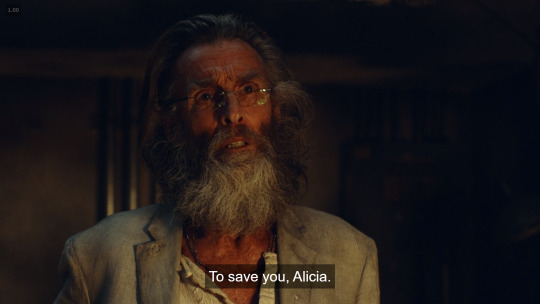
Anyway, he basically tells Alicia he has a special role for her and that he’s been looking for someone like her for a long time. He seems convinced that he can convert her to his philosophy, but he’s also fixated on the fact that she sacrificed herself for her family. So, it doesn’t say what he means by “someone like you” but I’m assuming someone who is brave or else self-sacrificial.
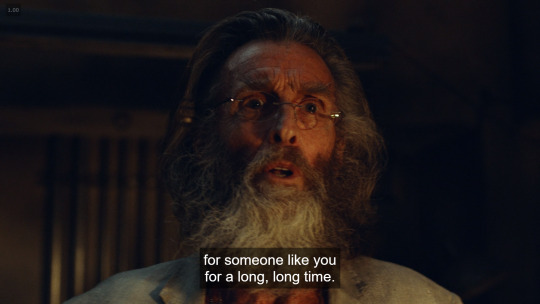
But here’s the thing. I’ve been thinking recently that they haven’t really done much with Alicia lately. She’s one of the few surviving originals for this series, and one of the most well known actors going into it, because she’s been on other highly-watched tv shows, but they’ve kind of been ignoring her.
So, I think this is the beginning of a big arc for her, and I think it will be a major parallel for what happened with Beth after she was left behind.
Alicia becomes a proxy here for Beth, not only because she’s in the Grady-like medical room, and stabs a guy in the eye, but Teddy totally razzes her about being left behind.
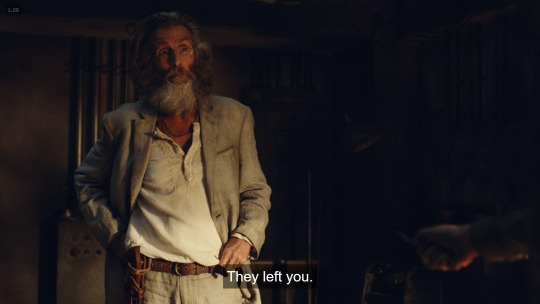
He says, “they left you behind.” She says, “I made them.” He says, “Yeah, but they obliged.” And then goes off about how they’re her family and family is sacred and they shouldn’t have done that.
And in my head, I’m screaming, “Beth! Beth! Beth!”
So yeah. Super intrigued by this episode. They’re setting up some really intriguing things and it will be very interesting to see what happens moving forward.

What did everyone else think of the episode?
#beth greene#beth greene lives#beth is alive#beth is coming#td theory#td theories#team delusional#team defiance#beth is almost here#bethyl
11 notes
·
View notes
Link
via Politics – FiveThirtyEight
Welcome to FiveThirtyEight’s weekly politics chat. The transcript below has been lightly edited.
micah (Micah Cohen, politics editor): Greetings, people. Today we’re going to have a super nice and respectful chat about a recent column from David Brooks of The New York Times.
clare.malone (Clare Malone, senior political writer): …
Nate drank his Gatorade.
micah: The column: “The End of the Two-Party System.” Can someone give us a fair summary of Brooks’ argument?
natesilver (Nate Silver, editor in chief): The summary is that we need the Reasonable Center Party, which happens to have exactly the same policy positions that Brooks has and would be enormously successful if only anyone bothered to create it.
micah: I said “fair.”
clare.malone: Brooks brings up the rise of basically what he’s categorizing as tribal politics, and compares it to European trends from the late 1990s and early 2000s.
He says that, at some point, conservatives and liberals will split themselves between true philosophical conservatives and liberals, and then the people who are the tribal conservatives and tribal liberals.
perry (Perry Bacon Jr., senior writer): A more generous summary might be that Brooks feels the Republican Party is too Trumpish and the Democratic Party is too stuck on race- and gender based-politics, and we need another party for people who don’t like those two ideologies.
micah: OK, I don’t want this chat to just be bashing Brooks’s argument; I want to talk about third parties. So let’s get the argument-demolishing out of the way …
There’s a ton wrong in this article, right?
natesilver: I mean, the main problem is that he doesn’t understand how parties work.
Which is a pretty big problem if you’re writing a column about parties.
I like Brooks, by the way (I really do) — this just wasn’t one of his best efforts.
perry: So, first, he points to the good old days of the 1990s. But as Julia Azari has written, we’ve always had very intense political conflict, it’s just more partisan now. Moreover, the 1990s were not great — as we knew back then but are learning more now — if you were, say, a woman trying to advance in many fields or an African-American who dealt with the criminal justice system.
Second, the pre-Trump Republican Party he describes skips over the racialized politics of, for example, Richard Nixon and Ronald Reagan.
micah: Yeah, this description of the GOP seems waaaaay off:
In the years after Ronald Reagan, the Republican Party was defined by its abundance mind-set. The key Republican narratives were capitalist narratives about dynamic entrepreneurs and America’s heroic missions. The Wall Street Journal editorial page was the most important organ of conservative opinion. The party’s views on other issues, like immigration, were downstream from confidence in the abundant marketplace and the power of the American idea.
What about all the racialized law-and-order stuff?
clare.malone: My real problem with the article is that he doesn’t really prove his case.
He says at the very end of it, in a single paragraph:
Eventually, conservatives will realize: If we want to preserve conservatism, we can’t be in the same party as the clan warriors. Liberals will realize: If we want to preserve liberalism, we can’t be in the same party as the clan warriors.
But wait … will they realize this? What about hyper-partisanship? And check this out from Pew:
natesilver: The article also skips over the importance of “values voters” and the evangelical movement to the George W. Bush coalition. (And to the Reagan coalition too.)
micah: But, Nate, explain how you think the article misunderstands how parties work.
natesilver: Du. Ver. Ger’s. Law.
Bam!
OK, that’s a pretty obscure reference. But its point is that party systems are heavily influenced by electoral structures.
You usually get two major parties, or maybe three, in first-past-the-post systems like the U.S. uses. Those European systems he’s talking about — where you have lots of viable parties — mostly have proportional representation.
It should really be “Duverger’s reasonably reliable empirical regularity” and not “Duverger’s law,” but it’s a pretty useful heuristic.
clare.malone: What a sentence.
My question is, when does Brooks think all of this is going to happen?
That is, is this something he thinks will come down the pike in 2020 (aka, David Brooks is a stan for Kasich 2020)?
Or is this something 25 years in the future?
natesilver: It will happen once more people read his columns and join the Reasonable Center.
micah: OK, so he sorta bungles parties and bungles recent U.S. political history, but let’s talk about the force he thinks will spur a viable third party …
Isn’t his argument like: People are getting really partisan and so therefore people will break out of partisanship?
That seems … wrong?
Or am I misunderstanding the argument?
natesilver: It’s not necessarily wrong to think that partisanship could abate. It does tend to ebb and flow. And it’s at a high end of the historical range now.
clare.malone: It’s really hard to build a party structure — state-level offices/organizers/money — which is one of the reasons that people tend to stay within the two major parties.
Like, if you wanted to launch a legitimate third-party bid, it would not be something that could happen overnight. The Libertarian Party has been trying for decades, and they’ve only recently been racking up margins that made a dent.
natesilver: And/but/also, the two-party system is pretty adaptable. Does the Republican Party under Trump look a lot different than the Republican Party under Reagan? Sure. But that’s why parties work!
clare.malone: Right. Parties shift priorities. The modern Republican Party emerged under Herbert Hoover. So maybe it won’t break apart now, it’ll just shift to a new iteration.
perry: I was thinking out loud about this before the chat, but the last new, big major party in America was in the 1850s, right? Lincoln’s Republican Party. It replaced the Whigs in many ways.
Trump’s rise is a major crisis to Republicans like Brooks and lots of other scholars who view Trump as kind of the worst possible type of president. So the idea is a Gov. John Kasich-like figure rises to create a new kind of party that is an alternative to Trumpism. I didn’t think that was impossible in October 2016. But it seems much more implausible now, since Republican voters broadly like Trump and it’s not clear that stopping Trump is some clarion call for people outside of the Democratic Party and the Acela corridor.
micah: Yeah, so that’s key: Is there demand/desire among Americans for a third party?
natesilver: Again, a lot of this is just that David Brooks had a party (the GWB-era GOP) that he once mostly agreed with and now he doesn’t have one. Which is annoying for David Brooks but doesn’t really provide much evidence either way in terms of broader public sentiment. There’s been a gradual uptick in the number of people who identify as independent, but it’s really quite gradual and quite mild:
micah: But that’s party identification … people do say they want a third party!
perry: I think there’s demand for changes in politics: a more populist economic strain and a more nativist strain. But it feels like the former is happening in both parties (Trump, Bernie Sanders) and the latter in the GOP with Trump.
In other words, we are seeing huge changes in politics, but they are within in the parties. (And in the opposite direction of where Brooks is, since he is not populist or nativist.)
natesilver: Yeah, exactly. Basically, Brooks is a Democrat now and doesn’t want to admit it.
micah: Explain that Gallup chart though.
clare.malone: I do think it’s fascinating that Americans say they want a third party.
And yet … where is it?
Maybe if the U.S. had less money involved in politics, you’d see more parties.
natesilver: I wrote something once about how Trump himself was essentially a third-party candidate. His platform during the campaign was quite different than John McCain’s or Mitt Romney’s — although he has arguably governed as a much more traditional Republican.
But part of the issue that Americans don’t want a third party — they want their third party.
perry: So, here’s a smarter take on third parties from Lee Drutman at Vox:
Yes, third parties in American politics are kamikaze missions. Because of our single-winner plurality system of elections, third parties almost never gain representation.
And yes, a serious third-party conservative challenge to Republicans would help Democrats in the short term, by siphoning off votes from Republicans.
But each month that the Republican Party has a leader who can’t conceal his overt racism, who calls the media the enemy of the people, is a month in which voters who identify as Republican have to update their worldview to fit with their partisan identity. Only losing, and losing bigly, will break this Republican partisan trajectory.
One more excerpt from Drutman:
Perhaps you like the idea of starting a Conscientious Conservative Party, but don’t like the idea of losing and tipping the balance of power decisively to Democrats. In that case, maybe you could get on board with changing electoral laws to make it easier for third parties.
Perhaps you could get behind the Fair Representation Act, introduced last year in the House, which would move us toward a proportional voting system by creating multi-member districts with ranked-choice voting. That means that even if the Conscientious Conservative Party could only get about 15 percent nationally, it would get some seats in the House — possibly enough to be a pivotal voting bloc for control of the chamber.
Or if that feels too bold, how about just straight-up ranked-choice voting, which would give people the chance to vote for the Conscientious Conservative Party and then list either the Democrat or the Republican as their second choice, ensuring that they could express their true preference without wasting their vote, and putting some pressure on both Democrats and Republicans to court Conscientious Conservatives to earn their second-choice votes.
The point is, third-party votes don’t have to be wasted votes. They’re only wasted votes because our electoral system makes them so.
natesilver: Yeah, look, I don’t want to go overboard in totally dismissing the idea of a third party. Also, independent presidential candidates can sometimes succeed irrespective of a more sustainable third party.
But as Perry says, a lot of the changes happen within parties. And independents fall into maybe three different categories — including lots of people on the “far left” and the “far right,” not just Reasonable Centrists.
micah: No one has yet explained to me what gives with that Gallup chart, though. If 61 percent of people think a third party is needed, what’s getting in the way?
Brooks is speaking for the masses!
natesilver: Because among that 61 percent, there’s 21 percent who want the Reasonable Center Party, 20 percent who want the Green Party, and 20 percent who want the America First Party
clare.malone: I mean, there’s no high-profile candidate from a third party. Jill Stein and Gary Johnson are too fringe. And their parties don’t have enough money. So no one except people who read sites like FiveThirtyEight ever vote for them.
micah: Don’t stereotype our readers!
clare.malone: Sorry, readers.
micah: Let’s do a poll.
If you're a @FiveThirtyEight reader, please answer this question:
Have you ever voted for a third party?
— Micah Cohen (@micahcohen) February 15, 2018
Anyway, how could we get more parties? Structural change, as Drutman wrote?
perry: I think so — it’s the structure of our electoral system that gets in the way.
natesilver: Yeah, see, Brooks should really be writing about the need for ranked-choice voting.
You’d probably wind up with slightly more fluid, centrist parties, although maybe not with more parties.
perry: Well, the parties would have to vote for structural change, and I don’t see that happening.
I think I could see an Emmanuel Macron-style situation happening in the U.S.
clare.malone: Macron is basically a Michael Bloomberg type but with less experience. Way less.
natesilver: Yeah. I’d put the odds of “independent candidate wins one of the next four presidential elections” quite a bit higher than “there’s a new major party within 16 years.”
perry: If, say, Sanders and Trump are the nominees in 2020, could the Reasonable Centrist Party do better? Macron is a centrist in policy but has a personality cult around him. Or had one.
clare.malone: I mean, if Sanders wanted, he could lean into the Democratic Socialist Party thing and try to build that out. It probably wouldn’t yield him the presidency in his lifetime, but it would perhaps bear fruit decades down the line. A delayed-gratification legacy.
micah: Sanders doesn’t seem the type for delaying gratification.
perry: Take Arnold Schwarzenegger in California in that very odd California 2003 environment. I felt like he could have won as an independent.
natesilver: But in the case where Sanders has won the Democratic nomination, he’d look like a more “traditional” Democrat by the time the general election rolled around. And the Democratic Party is moving in his direction anyway.
clare.malone: Right. Sanders realized that you need the big party in order to succeed. Even if you hate their guts.
natesilver: Could someone more radical than Sanders win the Democratic nomination? Maybe. Or a Sanders who also had lots of personal liabilities?
micah: OK, so if we all think that it’s much more likely that one of the two major parties will shift in a big way than that a third party will emerge, what could that shift(s) look like?
perry: Those shifts already happened to some extent. And the people who lost out on the them are the Jim Webb types in the Democratic Party and the Bill Kristol/Brooks types in the GOP.
micah: One hundred percent agree on GOP, but are we really ready to declare the Democratic Party fully shifted too?
In other words, is asymmetric polarization more symmetrical now?
clare.malone: Oh, Democrats got stuff a-brewing — though because they lost, it’s a less dramatic fight. But the party, in addition to some demographic changes, is much more liberal than it used to be:
natesilver: Neither party has fully shifted, but the Democratic Party is earlier in its process of shifting, I think.
perry: I’m just having a really hard time seeing the Kristol/Brooks wing retaking the GOP. I think, like Nate said, those people are basically Democrats now. And they should try to push the Democrats to be less-identity-ish.
natesilver: In terms of the Democratic Party shifting, the key question isn’t, “What does David Brooks want?” but, “What do young black and Hispanic voters want?”
micah: So, yeah, you two just identified the tension there, right?
clare.malone: Big ol’ tent, huh?
Big enough for Brooks and Kristol.
micah: It would have to be a huge tent!
Brooks describes the Republican Party of the 1980s without one mention of race — getting Brooks-esque voters in the same tent with liberal Democrats is gonna be tricky.
clare.malone: I mean, those guys are basically European conservatives, to go back to the Brooks point about European politics. And their being in the party for a while could, in 10 years, push the more left-leaning people to start their own thing.
Eventually the tent will get too crowded and some people will have to go to the overflow section.
natesilver: Right now, opposition to Trump unites white urban neo-liberals with white democratic socialists with black and Hispanic voters. You’d have a lot of tensions within that coalition down the road, though.
perry: Brooks and the other conservative anti-Trump voices have resonance, in part, because some Democrats at the elite level are wary of the identity stuff too but can’t say so publicly. (Let’s say Sanders and Biden, if you look at their immediate post-election comments.) But I think a party that is only about 25 percent white men doesn’t really care what Brooks thinks. The Democratic Party is going to get more Sanders-like, I think, in the short term. And this is going to frustrate people like Brooks, who should become Democrats. But could Biden win the 2020 nomination on a kind of unity platform? Maybe.
It feels like Brooks’s best hope is that the Democratic Party, in some kind of “Save America from Trump” move, embraces a style of politics that Jeff Flake, John McCain, etc., agree with but does not piss off young voters, minorities, women, socialists, Sanders types.
In other words, the parties really sort along immigration lines — the people with Trumpish views on race/immigration in one party, the others in a second party.
natesilver: Obama, in some ways, united all these different groups together in 2008 because George W. Bush was so unpopular. So if Trump is really, really unpopular by 2020, a Biden type could do great.
In the long run, I don’t think you can avoid these tensions, though.
perry: That’s a great point. The 2008 Obama campaign was a kind of unity ticket. He couldn’t recreate that in 2012.
micah: OK, and to wrap up: Is there any chance that the Republican Party becomes the party Brooks wants it to be?
clare.malone: That’s a negatory. At least in any sort of near-term future. I don’t think you can just forget about the forces in the party that manifested Trump.
perry: If Trump and Putin had a July 2016 phone call during which Trump told him to hack Podesta’s email, that call becomes public and Trump is impeached and removed from office … then maybe.
micah: See, I disagree with that, Perry.
perry: You think Putin made the hacking suggestion first?
micah: LOL.
The Trumpism in Republicanism predates Trump and — to a first approximation — would postdate him too, wouldn’t it?
natesilver: I’m on Perry’s side. If Trump is perceived to be a failure, there could be a reasonably sharp counterreaction to Trump. (Although, I’m thinking “failure” more in the sense of “he loses re-election,” not “he gets impeached,” which raises a different set of issues.)
micah: So, if Trump loses re-election, Republican primary voters suddenly move to the middle on immigration?
natesilver: STRAW MAN MICAH IS BACK
micah: Whose team are you on, Clare?
clare.malone: I’m not sure about my team. I guess I could see, in the case of a Trump flameout, Trumpians getting completely steamrollered by national establishment figures.
But then you’ve got a part of your base that is wildly unhappy with you. I guess they either leave or just become pains in your asses for the rest of time.
I’m not sure I’m on a team. I’m agnostic.
natesilver: Voters (maybe not voters in the GOP, but voters overall) are already moving left on immigration. The reaction to Trump has been fairly thermostatic, as the political scientists like to say.
micah: What does thermostatic mean?
natesilver: Public opinion tends to move in the opposite direction of the president’s policy preferences.
perry: But while I don’t think the Republican Party will change in the short term, I don’t rule out a strong third-party candidate doing well in 2020. There is some broad dissatisfaction with American politics that someone could capitalize on. Someone more like Oprah than Kasich, but I think it won’t be either one of them. I don’t know who that person is.
micah: OK, I’ll say this: Partisanship is sooooooo strong now that maybe it allows for more ideological/policy movement and flexibility. We’ve seen Democrats and Republicans flip on the FBI. We’ve seen Republicans flip on free trade, Russia and Putin.
So, in that sense, maybe it’s easier to imagine the GOP becoming more to Brooks’ liking pretty quickly.
If, in three years, a set of circumstances comes together so that the “right” set of partisan positions for Republicans is Brooks-ian, I don’t really have much doubt that partisan voters would support those positions — in the same way Republicans became anti-free-trade almost overnight.
clare.malone: I’ll buy that somewhat.
The FBI thing is really interesting. A good point.
perry: That’s a good ending point, I basically agree with Micah’s take there.
natesilver: Yeah, I hate to say it, but I basically agree with Micah too. The very intense partisanship we see in the country today is a sign that the parties are quite healthy, whether or not it’s good for democracy.
micah: OMG!
Let me just marinate in this moment for a little while.
4 notes
·
View notes
Text
0 notes
Text
and nothing ever does begin like nothing ever ends
chapter two: burgeoning
fandom: ars paradoxica, his dark materials
words: 1842
rating: T
characters: esther roberts, bridget chambers
read on ao3
series masterpost
September 7, 1935
"ritsa, stuff it!"
the small, pink milk snake curls tighter around esther's wrist and hisses, "i'm just sayin' she's cute is all."
"the bee?"
"both."
"ugh." esther takes a long sip of her drink and sets it back on the counter. unfortunately, her daemon is right. the bartender is extremely cute. both her and that bumblebee the size of her head. “you can’t keep trying to pick up girls for me, ritsa,” esther mumbles as she tucks her hair behind her ear. “especially not in public.”
just then, that very bartender looks over, catches esther's eyes, and smiles. she slides over to that end of the bar, accompanied by a soft buzz. "can i get you another?"
esther flicks her eye down at the half-full drink in front of her and decides that maybe this isn't that bad of an idea after all. "no, thank you, but maybe an introduction?"
"bridget. and this is galené— lené for short. i think we're in your gov class. it's esther, right?"
"yeah, shit, really?" esther's blushing now as ritsa tightens even further around her wrist. "uhh, this is ritsa, the little brat. she should have reminded me that we know you."
bridget laughs, and for a moment, esther feels less like an idiot. "we're lucky, huh?"
"how's that?"
"girl daemons.”
esther raises an eyebrow. "in my experience, it's only made people suspicious." esther doesn’t want to say outright what it makes people suspicious of, but she imagines bridget knows all too well about that stupid rumor.
"do they have a right to be?"
shit. the only reason ritsa's even whispering in public is because esther’s tipsy, and really, she certainly doesn't plan spilling any other details, but that smile... it feels safe. like telling bridget would be the most right thing in the world. "maybe."
esther's a little shocked when she's addressed by galené instead of bridget. "i'm kind of difficult to hide, y'know? so we figured we might be easier to just hide in plain sight."
"does— does she always address other people?“ esther looks to bridget, a little bewildered.
"yep. most talkative daemon i know."
ritsa, who doesn't ever talk to anyone but esther, unravels slightly and tilts her head toward the bee. “listen, you're like us. and you're cute. wanna go out sometime?"
esther clamps ritsa's mouth down with her thumb and forefinger and glances around the bar. the other patrons are either too far away or too drunk to have noticed, but her heart is still racing. "i'm so sorry, she's not usually this... forward."
bridget smiles, turns away, fills up another glass and slides it to a guy down the bar. she is unflappable. it's miraculous. "we'd love to," she answers, and scratches her number down on a napkin.
September 13, 1935
“you really got all of that out of it? because honestly, it just made me hate mr. rochester.”
“okay, listen,” bridget has both her arms crossed around the daemon on her lap and she adjusts her grip to lean forward onto the table. “i hear you, i really do. but if you would consider how he’s really just a stepping stone for her own emotional growth—”
“or he’s a nasty creep who took advantage of her stature and her age and exploited their relationship for his own personal gain.” esther untwists and retwists ritsa around her fingers, something she does often out of nerves or excitement. or in this case, both.
“or that. i mean i’m always approaching the work from a symbolic point of view, but there’s nothing wrong with a narrative analysis either.”
“you’re damn right there isn’t.” honestly, what she wouldn’t give to hear ritsa’s take on all of this. it is flirting right? even though they’re arguing about the required reading in English 101, this is… well, judging by the way bridget’s looking at her… yes, she would say it’s flirting. she tucks her hair behind her ear slowly and looks up.
bridget blushes and lené shifts in her lap, the pitch of her nonstop buzzing increasing just a little bit. “so… is this something you do often?”
“uh, not like this, no.”
“but, at the bar, ritsa seemed so confident…” bridget’s blush deepens.
esther’s starting to realize they might have more in common than she thought. she clears her throat and admits, “my only experience with girls— well, one girl, was in the alleyway between our apartments.”
“oh, thank god,” bridget sighs and smiles. “here i was thinking that since you’d asked me out, you’d done this the proper way— not that there really is a proper way— several times before.”
“oh no, not at all.”
“me neither. i guess you could say my experiences have been… similar to yours, although they may have involved a slightly more comfortable location.”
though they’re both blushing now, esther can’t help but realize how liberating this is. it’s not like she was expecting to find someone like her in college, nor even dared to hope that she would, let alone someone this beautiful and passionate and intelligent. certainly there’s a part of her that’s afraid to get attached, afraid of the consequences, but that part is greatly outweighed by the curiosity and attraction she feels toward bridget.
ritsa winks at lené, who lifts up out of bridget’s lap and flies in a few circles before hovering about her shoulders.
“okay,” esther begins with a grin, “what did you think of john rivers?”
October 12, 1935
bridget holds esther’s hand in hers as they sit in the common room well after midnight. esther is indescribably excited about her and the four official dates they’ve gone on over the past month. and gosh, having her hand held in such a soft and comforting way is doing all kind of things for her emotional well being, and with ritsa coiled on lené’s back, she’s pretty sure she could die happy right now.
they’ve been talking for hours now, trading life stories and family history. esther learns that bridget’s parents immigrated from eireland and from a tiny province in the german electorate, respectively. esther in turn tells her about her muscovy father and how her mother’s family has been living in new denmark for over a century now. they talked about religion, and while both of them have hebrew parents, only esther is really practicing. they talk about their dreams and their childhood friends, and eventually, they take turns asking each other as many silly questions as they can think of.
it’s been silent for a bit now, though, when bridget says, cheeks reddening, “you know, other couples— i mean, obviously, we’re nothing like them, but— if it’s alright… i’d like to refer to you as my girlfriend. in my head, i mean. and to you.”
esther, full of both joy and warmth, nods vigorously and squeezes bridget’s hand. “and same to you, i mean, that is, can i call you my girlfriend too?”
“yes. yes.”
it’s silent again, but only for a moment, as esther picks back up their question game. “coffee or tea?”
“coffee.”
“because it keeps you…buzzed?” esther can’t keep the shit eating grin from her face as she gestures at galené with her free hand.
this earns her both an eyeroll and a smile. “you?”
“tea, but that’s my mother’s fault.”
“what is your favorite book of all time?”
“can i say a philosophy book i read for kids when i was ten?”
“i guess. mine is the odyssey.”
“wow, okay, way to show me up. name three things you’re afraid of.”
“the dark, calculus… this, i guess.”
ritsa shifts around on esther’s wrist and it takes her a second before she answers. “i understand the first, i’d marry calculus if i could so i really don’t get that, and bridge— i’m scared too.”
bridget chuckles nervously and pulls lené closer to her body. “i’m scared of not doing this right, i’m scared of losing you, i’m scared of people finding out. my parents, the school— like could we lose our scholarships over this? is it— it’s not illegal, but it’s— god, ettie. it’s so bad.”
“i’m not going anywhere. me, you know, agreeing to the girlfriend thing? that was me saying i’m sticking around.”
“i know that.” bridget’s eyes close tightly and esther has to stop herself from wrapping her arms around her girlfriend (her girlfriend!!!) “but the rest of it?”
“scary as hell and i completely agree.”
“great. you’re so helpful,” bridget answers with a biting tone but a soft expression, and esther knows she’s starting to get to her.
“the thing is, we’re in it together. whatever happens. if we get found out, we face the consequences together. if one of our parents finds out, we’ll get through it together. and not to jump the gun, but if we live happily ever after…?”
“yeah, i see where you’re going with this. we’ll be happy together. it’s like,” she smiles brightly and says, “it’s like bridget and ettie versus the world.”
ritsa slides forwards and flicks her tongue at one of lené’s antennae, who in turn bops her on the head.
“you’re right.” esther smiles back and leans forward to kiss her cheek. “and you’re cute.”
November 23, 1935
esther hasn't let go of bridget's hand the entire run down the block, and while they stand in front of the elegant apartment building, their palms have started to sweat.
"what exactly are we doing here?" bridget asks, only slightly afraid of the wicked glint in her girlfriend's eye.
"philosophy. specifically, physics."
both bridget and lené let out groans of frustration, to which esther and ritsa both respond with a giggle.
esther pushes open the door with her free hand and leads bridget inside. “i made friends with the bellhop who runs the elevator because i knew i was going to need to call in a few favors.”
“oh, no.”
“oh, yes.” esther holds out her arm and ritsa slithers toward the UP button, pressing it gently with her snout.
as they walk through the doors, they greet the operator, and esther asks him if they can use the elevator for a bit. he smiles, and leaves them be.
“so remember how you were complaining about the moving object gravity lesson from ornathy’s class?”
“i don’t like where this is going,” bridget leans on the back of the elevator car cautiously, and shares a look with her daemon.
“that’s unfortunate, because we’re about to have a lot of fun.”
“physics is never fun.”
to bridget’s count, they spend at least an hour and fifteen minutes taking the elevator up and down and jumping like children whenever it lands on a floor. it is extremely fun, and they giggle nearly nonstop the entire time as esther shouts out vector diagram descriptions. but, bridget has to admit, professor ornanthy’s lesson makes so much more sense now.
out of breath and exhausted, she leans on esther the whole way out. “thank you,” she whispers.
“it was my pleasure. wanna go get a hot chocolatl?”
“abso-fucking-lutely.”
15 notes
·
View notes
Photo
[image description:
A twitter thread from Cookie Cyboid @CookieCyboid, posted 6 December 2018, link to first tweet here
“Why are Tumblr and Facebook cracking down on sex so much? And why is Facebook in so over zealous about it? It’s all Apples fault!” Etc etc I can explain all. It is largely the fault of a set of US laws called SESTA and FOSTA.
Here’s an article about them, but in short these laws make websites responsible for third party content related to sex work. They can be sued for having full service sex work ads on their platforms EVEN IF THEY DIDN’T KNOW ABOUT IT link to vox article here
I’ll get to Tumblr and Facebook but first just lemme take a second to tell you these laws don’t do what they’re designed to do. They don’t stop trafficking, they actually make it harder to find victims. Turns out the easiest way to find victims is online.
Also turns out if you remove sites used to screen clients, pimps spring up offering safe client lists. Removing advertising also forces sex workers out onto street corners link to rolling stone article here
These laws were passed in April and we saw a lot of sites disappear overnight. So why are Tumblr and Facebook acting now?
They come into force next month. Next month any website with a US presence can be sued if it allows, even unknowingly, sexual solicitation.
To my mind, Tumblr saw Apple removing the Tumblr app from their store and went “eh, we needed to ban porn anyway, we’ll just act early” Their algorithm sucks because training an algorithm to spot lewd content is incredibly difficult.
Facebook yesterday announced its policy on sexual solicitation. Which is ludicrously overzealous, bans the discussion of anything related to sex, including incredibly vague language like “I’m looking for a good time tonight”
The reason they’re so overzealous isn’t because they’re screaming “somebody think of the children” It’s because if they miss *one* ad, they can be sued. They know algorithms for this suck, so they’ve decided to overcompensate for that and effectively ban talking about sex.
These laws come into force next month. At that time I expect twitter to also crack down on sex work. I don’t expect we’ll be warned, twitter will just remove our accounts overnight.
“Why don’t you start your own website, you aren’t US based, just do that” There are a myriad of reasons I can’t do that, 1. Age verification laws are going to happen soon here and I can’t afford to pay for that software 2. The UK gov is considering our own Sesta/Fosta laws.
Go to PornHub! Mate I’ve made my opinion on that hellsite very clear. I don’t need another store front. I need a place to communicate with queer communities and advertise. PornHub fucking sucks.
Sesta/Fosta is an attempt to limit not only sex work, but queer expression online. Queer relationships are seen as inherently sexual to some. We need to be fighting this, because it’s not just a stick to hit sex workers with.
To my mind these laws were always about stopping consensual sex work, whilst also punching at queer people, and sexual expression. This is a censorship bill.
Yell at your elected representatives America. Make them realise what this is, because it was sold on stopping sex trafficking. The optics on it were so good that all the democrats voted for it too. Liberals are just as much at fault here.
I know there is a lot happening, and it’s hard to keep up with it all, but this is important. Sesta/Fosta needs to be repealed.
end image description]

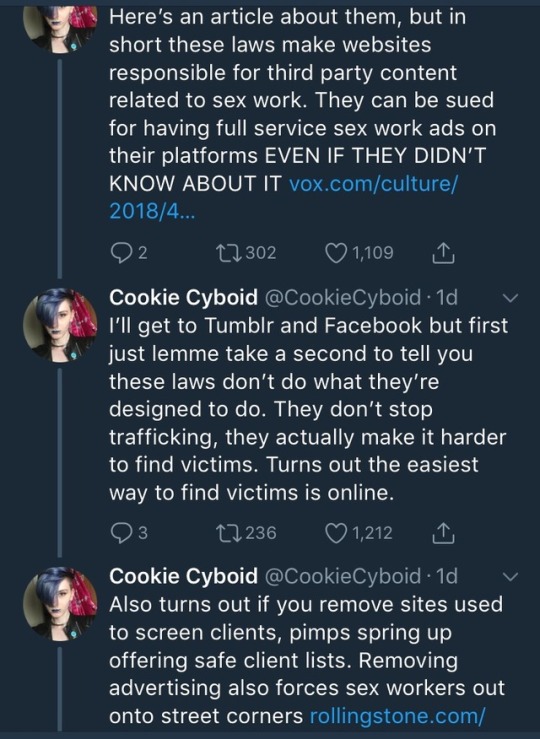


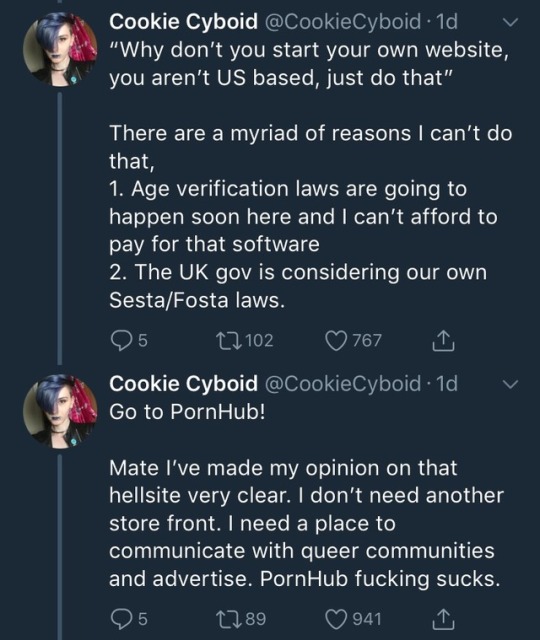

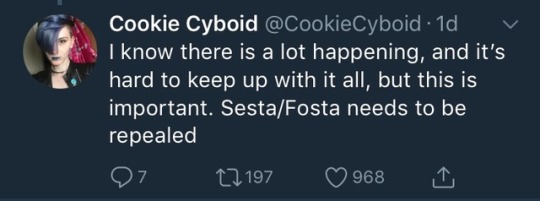
this was a good thread i saw about how of course this is all more trash coming down from the total shit that is sesta/fosta
48K notes
·
View notes
Link
The successful evacuation of large areas of Texas in preparation for Hurricane Harvey, which is expected to make landfall early Saturday morning and could cause devastating amounts of damage, depends on Texans putting their lives in the hands of the government. A White House statement issued Friday urged residents to “heed the advice and orders of their local and State officials”; the president’s homeland security adviser, Tom Bossert, said that “now is not the time to lose faith in government institutions.”
But many of the Texans living in the hurricane’s path are unauthorized immigrants, who have very good reasons not to trust government in general, and the Trump administration (and Texas state government under Gov. Greg Abbott) in particular. And even with Harvey gathering speed in the Gulf of Mexico, the government is sending mixed messages about whether it wants to save immigrants or deport them.
Customs and Border Protection will continue to operate roadside checkpoints within 100 miles of the US-Mexico border during the evacuation. They’ll only close a checkpoint if it’s in the hurricane’s path and the highway it’s on is closing.
The state of Texas, which has announced that it won’t be checking the legal status of people who check into emergency shelters, and the federal government have both stressed that the “highest priority is the safety of the public.” But in practice, having a top priority sometimes means putting other priorities aside. And cracking down on immigration, in particular, is the sort of agenda that can easily make other government priorities harder to execute — when the government suddenly needs unauthorized immigrants to trust it, after giving them every reason in the world not to.
Unauthorized immigrants won’t be asked for IDs at shelters — but could be stopped en route by Border Patrol
The last time Texas was hit by a major hurricane — Hurricane Ike, in 2008 — the message sent by Homeland Security Secretary Michael Chertoff was clear: Residents should be able to evacuate without worrying they’d be stopped at a checkpoint, because Border Patrol agents wouldn’t do anything to impede a speedy evacuation of the area.
The Bush administration didn’t shut down the checkpoints entirely. But Chertoff instructed agents, "We're not going to be bogging people down with checks or doing things to delay the rapid movement of people out of the zone of danger." (The announcement was celebrated by then-Texas Gov. Rick Perry; a spokesperson for Perry said that it would be “nonsensical” to keep checkpoints operating at their typical pace during an evacuation.)
The message sent by the Trump administration is very different. “The Border Patrol is a law enforcement agency and we will not abandon our law enforcement duties,” said a statement from the Rio Grande Valley Sector office Thursday that announced that checkpoints would remain open. And while a spokesperson for the sector clarified that “we’re not going to impede anybody getting out of here,” that assurance was absent from a statement issued from Customs and Border Protection headquarters on Friday:
U.S. Border Patrol checkpoints in the path of Hurricane Harvey in Texas will close as state highways close. These closures will occur in a manner that ensures the safety of the traveling public and our agents. Border Patrol checkpoints that are outside of the path of the hurricane will remain operational. CBP will remain vigilant against any effort by criminals to exploit disruptions caused by the storm.
It’s possible that in practice, Border Patrol agents at checkpoints will conduct speedier or less frequent checks than usual in the interest of keeping the evacuation moving. But the concern is only in part about what is actually happening; it’s partly about what unauthorized immigrants in the path of the storm worry will happen.
Border patrol agents in the Rio Grande Valley told Vox earlier this month that unauthorized immigrants who live in their communities tend to know where the checkpoints are and avoid them. That’s not necessarily possible during a hurricane evacuation. Given the choice between sticking out the storm and risking arrest and deportation to escape it, it’s entirely possible many Texans will choose not to leave.
Immigrants under Trump — and in Texas — were already dealing with a deficit of government trust
To a certain extent, the checkpoints are undermining a federal and state attempt to get unauthorized immigrant Texans to feel just as safe evacuating as everyone else. Gov. Abbott has said that state officials won’t check legal status at emergency shelters, and CBP issued a joint statement with Immigration and Customs Enforcement (ICE) on Friday saying that “Routine non-criminal immigration enforcement operations will not be conducted at evacuation sites, or assistance centers such as shelters or food banks.”
But even if Border Patrol were following their lead and closing the checkpoints, it’s not clear how successful the evacuation of Texas’s unauthorized immigrant population would be. Because both the Trump administration and the state of Texas are struggling to overcome, for the sake of hurricane preparation, the signals they’ve sent unauthorized immigrants for months: to stay away from government.
Unauthorized immigrants are often wary of seeking government assistance even in the best of circumstances, and their isolation can keep them from finding out important information: Many immigrant residents of Flint, Michigan, for example, found out about the prohibition on drinking the city’s lead-contaminated water months after the rest of the city did. High-profile immigration enforcement makes that even harder.
After an immigration raid in Austin in February, school attendance briefly plummeted; local immigrant-patronized businesses took weeks to recover, as immigrants slowly became comfortable leaving their homes. Similar things have happened in other communities around the US.
Many local officials have tried to counteract the fear of government instilled by the federal immigration crackdown. But in Texas, those efforts have been systematically undermined by the state government — whose “anti–sanctuary cities” bill doesn’t just punish city police departments for declining to assist with federal immigration enforcement but allows any police officer in Texas to ask people about their immigration status during operations.
That bill, SB 4, is set to go into effect September 1. Once that happens, an unauthorized immigrant going out in public will be a risk — and any interaction with a police officer could start a one-way track to deportation.
And yet a week before that happens, the state of Texas is asking immigrants to trust the state with their lives.
The Trump administration’s dedication to cracking down on immigrants limits its effectiveness in other areas
The definition of an emergency is that business cannot continue as usual — that certain things have to be stopped or suspended because they distract from, or undermine, the goal of saving lives during a natural disaster and rebuilding property afterward.
Immigration enforcement is often one of those things that has to be deprioritized. Border Patrol agents have to assist with rescue and recovery when natural disasters take place on their turf. Sometimes rules have to be bent or waived to make sure storm victims aren’t victimized twice: The Bush administration allowed international students affected by Hurricane Katrina to apply for deferred action as a protection from deportation, for example.
And the work of rebuilding a community often (as it did after Katrina) physically relies on immigrant labor, supplied by contractors who don’t always have the resources to check everyone’s papers — or the manpower to rebuild what’s needed with citizens alone.
It’s a simple reality of triage: Having a “highest priority” means other priorities have to be, temporarily, demoted.
The Trump administration, however, has made its immigration crackdown the centerpiece of its agenda. Immigration has been the issue the president returns to whenever he’s feeling thwarted; it’s the one thing his otherwise understaffed executive branch has most thoroughly repudiated his predecessor’s policy on.
That crackdown entails trade-offs for public trust in government. It was clear when police departments around the country saw a drop in the number of Latina women reporting domestic violence — while reports from white women didn’t change. It is clear again now, with the evacuation.
In both cases, administration officials have simply declared that people ought to trust the government to do the right thing. Interim ICE Director Tom Homan has said that no one should be afraid to report a crime; when asked about the checkpoints in the Harvey evacuation, Bossert, the homeland security adviser, said Friday that “people shouldn’t be fearful about going to a shelter and getting food and water.”
Telling people they shouldn’t be afraid of something doesn’t stop them from fearing it — especially if they have good reason for their fear. Trust in government isn’t something that can be turned off and on like a spigot. And moments like this are exactly the time when it becomes clear how hard it can be for government to save people, when it’s worked so hard to persuade them the government wants to punish them.
6 notes
·
View notes
Text
2:00PM Water Cooler 8/6/2019
Digital Elixir 2:00PM Water Cooler 8/6/2019
By Lambert Strether of Corrente
Patient readers, this is a wildly out-of-whack Water Cooler that I will shortly rebalance. I needed to do a pantry clear-out on the Politics section, which I did not complete because I got a late start. I also need to add the material about the feral hogs (you’ll find out). I hope there’s enough to inspire in the mean time. –lambert
Politics
“But what is government itself, but the greatest of all reflections on human nature?” –James Madison, Federalist 51
“They had one weapon left and both knew it: treachery.” –Frank Herbert, Dune
“2020 Democratic Presidential Nomination” [RealClearPolitics] (average of five polls). As of August 1: Biden fluctuates to 32.2% (32.0), Sanders up to 16.5% (16.4%), Warren down at 14.0% (14.8%), Buttigieg flat at 5.5% (5.6%), Harris down at 10.3% (11.0%), Beto separating himself from the bottom feeders, interestingly. others Brownian motion. If these trends continue in the next release, Sanders will the only winner of both debates.
* * *
2020
Gabbard (D)(2): “Inside the Tulsi Hive” [The Baffler]. “It is true that the Democratic Party is depressingly thin on marginally palpable foreign policy positions, and that, with the DNC’s blackballing of Mike Gravel, she will likely be the most anti-war candidate on display this evening. But despite her Nation byline and experience as a Bernie surrogate, Gabbard’s is not a foreign policy of the left.” • Which is fair; The American Conservative is sound on intervention. This is not an article Gabbard supporters will like.
Sanders (D)(1):
"I am proud and honored to endorse Senator Bernie Sanders for the presidency of the United States." pic.twitter.com/Y7uf8ebbhD
— Mike Gravel (@MikeGravel) August 6, 2019
Sanders (D)(2):
.@BernieSanders "Ohhh they've got skee ball. I love skee ball!" pic.twitter.com/e13XMS0Asr
— Bryan Lawrence

(@BreatheNewWinds) August 5, 2019
Surely coincidence, but I did call for a bit more “joy” from the Sanders and Warren campaigns just the other day.
Trump (R)(1): “Trump Outperformed His Popularity in 2016. That Might Not Happen in 2020” [Ed Kilgore, New York Magazine]. “Again, the X factor in comparing Trump’s likely vote in 2016 and in 2020 is incumbency, which we tend to think of as an asset even when it’s not. If there is any incumbency advantage, it’s likely baked right into Trump’s approval ratings. As Kondik points out, the relationship between presidential approval and reelection-year vote share is strong. Among presidents winning reelection, Obama exceeded his election-eve approval rating by one point in 2012 (as did Reagan in 1984), and George W. Bush exceeded his by two points in 2004. The only recent president who exceeded his approval ratings in vote share by more than two points was Poppy Bush in 1992, and he got beaten like a drum. It’s worth thinking about this, too: For all the talk about Trump’s boffo economy, overall public assessments of the direction of the country remain sour…. An unpopular president leading an unhappy country could still get reelected, but the widespread, 2016-based belief that Trump is on some clear trajectory to a second term is mostly superstition… An unpopular president leading an unhappy country could still get reelected, but the widespread, 2016-based belief that Trump is on some clear trajectory to a second term is mostly superstition.”
Warren (D)(1): “Warren faces lingering concerns about her ability to beat Trump” [The Hill]. “One strategist who is neutral in the race argued that part of the problem comes down to the one possible mistake Warren made ahead of the race: her decision to take a DNA test after President Trump repeatedly mocked her for her claim that she was Native American. ‘Everyone remembers how she played right into his hands,’ the strategist said. ‘I think a lot of people look at the moment and say she can’t go up against Trump because she’s not electable even if she is a damn good candidate.’” • One thing about Sanders: You can be confident Trump will never get inside his head.
* * *
“Here Are The Democratic Presidential Candidates With The Most Donations From Billionaires” [Forbes]. “As of the last filing deadline with the Federal Election Commission on July 15th, 67 billionaires — including spouses and members of billionaire families — had donated to the 20 Democratic candidates that debated in Detroit last week.” • Here are the rankings:
#1 Pete Buttigieg: 23 billionaire donors #2 Cory Booker: 18 billionaire donors #3 Kamala Harris: 17 billionaire donors #4 Michael Bennet: 15 billionaire donors #5 Joe Biden: 13 billionaire donors #6 John Hickenlooper: 11 billionaire donors #7 Beto O’Rourke: 9 billionaire donors #8 Amy Klobuchar: 8 billionaire donors #9 Jay Inslee: 5 billionaire donors #10 Kirsten Gillibrand: 4 billionaire donors #11 John Delaney: 3 billionaire donors #12 Elizabeth Warren and Steve Bullock: 2 billionaire donors each #13 Tulsi Gabbard, Andrew Yang, and Marianne Williamson: 1 billionaire donor each #14 Bernie Sanders, Julian Castro, Bill De Blasio, and Tim Ryan: 0 billionaire donors
El Paso Shooting
Readers, I’m still hung up on a post on the El Paso shootings. My basic idea is to conceive of the country as a sort of cracking tower, with Patrick Crusius, the shooter, as a highly refined product from the very top of the distillation column. (Most of us proles are mere crude, at the bottom.) The various levels of our cracking tower would be, from highest to lowest:
5 Priming and Triggering 4 Mobilization 3 Ideology 2 Ascriptive identity 1 Political economy
I’m thinking of this structure (model) partly just to have buckets to throw the mass of material into, and partly to have a way to sort out where policy intervention should take place. But I’m not sure if I’ve got all the levels I need. Gun purchase might fit under mobilization, for example, if we think of the purchase as logistics. Video games might go under ideology, if we think of ideology as lived experience. Ineffectual Democrat efforts would go under mobilization. Trump’s speeches might (arguably) go either under ideology or priming. I’d welcome comments — ok, help — from readers on this structure.
* * *
“String of gun deaths reshapes Democratic primary” [Politico]. “The tragedies have the potential to change the dynamics in the broader campaign for the White House, as President Donald Trump and his supporters reeled from comparisons of their rhetoric about immigrants with that of a manifesto suspected of being from the shooter in El Paso, a border city with a mostly Latino population.” • I’m not sure I’m up to the task of putting on my yellow waders and reading the manifesto, but I think Politico is right that the manifesto is important; it distinguishes the El Paso shooter from the Dayton shooter.
Blooper #1: Trump gets Dayton mixed up with Toledo:
Holy Toledo, it wasn’t even on the TelePrompTer. pic.twitter.com/vviFo7vqMw
— Andrew Feinberg (@AndrewFeinberg) August 5, 2019
Blooper #2: “Confused Joe Biden condemns shootings in ‘Houston’ and ‘Michigan’ when the deadly massacres actually happened in El Paso and Ohio” [Daily Mail].
Our Famously Free Press
WaPo is up to their usual tricks:
I’ve complained about @washingtonpost #bernieblackout before – but this example is totally infuriating. This story includes this bizarre quote, “The only candidate who has completely shunned wealthy donors at private fundraisers is Warren. REALLY?! https://t.co/Itg09SDMhS
— James J. Zogby (@jjz1600) August 5, 2019
The Debates
Yes, this is what the debates were like. Click the graphic to expand:
Somebody needs to produce this immediately. Make this into a @Netflix series and I will binge every single episode. pic.twitter.com/SVAn0dnpQo
— Bryan Lawrence

(@BreatheNewWinds) August 4, 2019
The networks really shouldn’t be doing the debates. It degrades democracy to treat the process like a wrestling match, and my baseline for degradation is pretty low.
Realignment and Legitimacy
Liberal Democrats:
This arrow by mathematician and sculptor Kokichi Sugihara can't point left. Here's how it works: It's 3D-printed with a bunch of curves our brains don't register. pic.twitter.com/Xa32GrI7ii
— Khai (@ThamKhaiMeng) August 4, 2019
“Diversity Dustup Renews Call For Democrats’ Campaign Arm To End Consultant Blacklist” [HuffPo]. “Our Revolution, the Progressive Change Campaign Committee and the Harvard College Democrats argue that the [DCCC policy blacklisting consultants and firms that work for candidates challenging House Democrats in primaries] makes it harder for women and people of color to win seats in Congress…. Maria Langholz, a spokeswoman for the Progressive Change Campaign Committee, argued that gender and racial diversity often go hand-in-hand with advocacy of more progressive policies.” • Like with Obama, whose black skin enabled a direct readout of his progressivism, as is well known.
“Swing State Dems Could Pay Price for DGA Chief Raimondo’s Ethics Woes” [Inside Sources]. “Today, Gov. Raimondo is embroiled in controversy over a secret, no-bid, billion-dollar gaming contract; the Rhode Island GOP has filed a formal complaint against her with the state’s Ethics Commission; and polls show she has the highest disapproval rating of any Democratic governor in America. Raimondo’s first term as governor was dogged by questions over a lack of transparency regarding questionable fundraising and allegations of “pay-to-play” scandals, but she rode the 2018 anti-Trump “blue wave” to re-election. That’s not necessarily a surprise to people familiar with Rhode Island’s tradition of embracing ethically-elastic politicians. What is surprising is the decision of her fellow state executives to make Raimondo chair of the Democratic Governor’s Association (DGA) and, as a result, bring her controversies from Rhode Island to Washington.”
“Voters, groups, parties, and elections” [Lane Kenworthy]. “While the two parties have been evenly matched in national elections in recent decades, a number of indicators suggest looming difficulties for the Republicans: demographic trends, the rise of postmaterialism and accompanying decline of cultural conservatism, and the progressivism and Democratic voting of younger cohorts. Backlash against growing racial diversity and immigration will help the Republicans, but California’s experience over the past generation suggests it may do so only temporarily.” • A lengthy but interesting wrap-up, concluding, as yo see, with support for the “coalition of the ascendant” thesis.
“Who Should Secure Congressional Campaigns?” [Idle Words]. “[W]hat I mean by campaign security: protecting the online lives of people on and around a campaign from intrusion, with a special emphasis on their personal email and social media accounts. I emphasize the personal part because many campaign security efforts start by declaring personal data out of scope, and then solve the easier problem of protecting what’s left. This is like putting a lock on your glove compartment to deter car theft.”
* * *
DSA Convention on fascism. Thread:
Today at @DSAcon2019, there was vigorous debate over Resolution #9 to establish a national antifascist working group. Dissent and debate is always good, but this is an issue of great importance to me, so I tried to do something I rarely do: publicly argue against the resolution.
— Leonard Pierce (@leonardpierce) August 4, 2019
“The democratic socialist revolution comes to a crossroads” [NBC]. “On the night Donald Trump won the presidency in 2016, the Democratic Socialists of America had about 8,000 dues-paying members. By the time the group opened its 2017 convention the next summer, its ranks had grown threefold. This past weekend, when delegates from around the country gathered here in Georgia, the number was more than double that — DSA is now home to 56,000 mostly young activists, making it the largest socialist organization in the country. More remarkable than its growth, though, is DSA’s increasing presence on the electoral stage. Nearly 100 democratic socialists now hold office at almost all levels of government, from local school boards to the US Congress, where freshman Reps. Alexandria Ocasio-Cortez of New York and Michigan’s Rashida Tlaib are at the front line of the fight over the Democratic Party’s future — and independent Sen. Bernie Sanders of Vermont, though not directly affiliated with the group, is mounting his second campaign for the party’s presidential nomination.” • DSA coverage still seems reasonably objective, I can’t think why, especially with RussiaGate.
News of the Wired
“From a wrongful arrest to a life-saving romance: the typos that have changed people’s lives” [Guardian]. “Much later, years later, he would learn that a single-digit typo had tied his computer, via its IP address, to someone else’s crime. But that first Saturday, waiting in a cell, Lang knew none of this.” • And much, much more. No doubt the same will happen with facial recognition.
* * *
Readers, feel free to contact me at lambert [UNDERSCORE] strether [DOT] corrente [AT] yahoo [DOT] com, with (a) links, and even better (b) sources I should curate regularly, (c) how to send me a check if you are allergic to PayPal, and (d) to find out how to send me images of plants. Vegetables are fine! Fungi are deemed to be honorary plants! If you want your handle to appear as a credit, please place it at the start of your mail in parentheses: (thus). Otherwise, I will anonymize by using your initials. See the previous Water Cooler (with plant) here. Today’s plant (JN):
A bit late, I guess, for blossoms against the sky, but the color goes nicely with the bonus (Marku52):
Yesterday, I posted Re Silc’s lovely mobile and asked if other readers would care to submit photos of similar projects. Marku52 responded immediately, writing: “Here’s mine. I take an image off the internet, print on transparency, blow it up using a garage sale overhead projector. Outline the image on thin steel with pentel, then cut out with a plasma cutter. A lot of grinding to clean up, weld on accessories, then paint.” Neat! Reader, how about you?
* * *
Readers: Water Cooler is a standalone entity not covered by the annual NC fundraiser. So do feel free to make a contribution today or any day. Here is why: Regular positive feedback both makes me feel good and lets me know I’m on the right track with coverage. When I get no donations for five or ten days I get worried. More tangibly, a constant trickle of donations helps me with expenses, and I factor in that trickle when setting fundraising goals:
Here is the screen that will appear, which I have helpfully annotated.
Readers, thank you very much. The mix of one-time contributions to smaller, monthly subscriptions is now more like what is was, and hence the total I budget for is back to normal as well. Remember, a tip jar is for tipping! So if you see a link you especially like, or an item you wouldn’t see anywhere else, please do not hesitate to express your appreciation in tangible form…
If you hate PayPal, you can email me at lambert [UNDERSCORE] strether [DOT] corrente [AT] yahoo [DOT] com, and I will give you directions on how to send a check. Thank you!

2:00PM Water Cooler 8/6/2019
from WordPress https://ift.tt/2TfOoKv via IFTTT
0 notes
Text
2017 Re-Watch: 3a
Good morning! So here are some observations about 3a.
First, I gotta mention the premier (3x01). Beth, of course, sings Parting Glass for the group the first night they clear out the prison yard. It’s one of my favorite scenes because Daryl stares at her as she sings, which is nice. ;D.

Actually, this is kind of a theme in s3. You don’t get a full picture of it until 3b when Merle comes to the prison. Beth sings again one night (I believe it’s in 3x11, just before Clear) and Merle does the same thing. Merle also comes out of the darker part of the prison where he was hanging out by himself, away from the rest of the group, to watch her sing:

I’ve always just found it interesting and sweet. The Dixon boys wouldn’t have grown up with music in their house. It’s like they’re transfixed by her singing. I’ve always loved that.

But I digress.
When they get inside the prison, and everyone starts finding cells to sleep in, Daryl says, “I ain’t sleeping in no cage.” Just struck me as an early sign of Daryl’s aversion to imprisonment, which obviously we saw a lot of this season. I do believe he moves into a cell eventually, but only after they’ve been there awhile and it’s started to feel more like a home.
Beth is very hopeful after Hershel loses his leg. Maggie decides he’s going to die and mourns him even before he’s dead. (Sound like what happened with Beth in S5?) Beth, on the other hand, is hopeful and practical. She has faith he’ll pull through and even goes so far as to cut and mend his pants to compensate for the missing leg. So he’s not dragging a pant leg around. Just kind of interesting. Obviously she’s always been this way. Always been the one to “do something.” And obviously this could have been built on for S4.

3x03 - The helicopter crash. Okay, the crash itself isn’t very significant. They used it to introduce the Governor and his anarchy. Something occurred to me that never had before. We see a helicopter crash, and two minutes later, in the same scene, Merle–who’s been missing for almost 2 seasons–returns. Now, the only other time we’ve seen a helicopter crash was in 4x01, which included the Bethyl hug and Beth coming front and center. Granted, 4x01 was the beginning of her arc rather than the end, but I wonder if the helicopter crash was included partly to foreshadow her parallels with Merle. Disappearing and then later reappearing. Just an idea. (P.S. They also focused on a helicopter in 1x01 after Rick awoke from his coma. Just saying.)
3x04 - Something Merle said to Andrea in this episode stuck out to me. She gave him a map of Hershel’s farm and where they’d searched for Sophia. Merle wanted to go look for Daryl. Of course Andrea didn’t know where the group ended up. Remember on Monday I said the theme of Andrea being left behind by the group continues heavily into S3? Well, here it is.

Merle pressures her to come with him. He wonders why she’s not more curious about the wellbeing of the group. She gets this self-conscious look on her face, and he puts the pieces together. She’s either angry or sad about being left behind. She knows it wasn’t on purpose, but now she’s in Woodbury and likes it, so she has little interest in rejoining the group, even if Merle finds them. Then Merle says, “We got something in common. We were both left behind by the same group.” Like I said, it stuck out to me because it’s a being-left-behind theme shared by Andrea (many of whose arcs went to Beth) and Merle (who disappeared and reappeared several seasons later). About the only other things these two characters have in common is knowing Daryl (and TF) and having massive parallels to Beth. Just saying.
So to add to this, I don’t read the CBs. So I asked my FB group to fill me in about Andrea’s story lines in the CBs. Those who read them know none of what happened with Andrea in S3 happened in the books. She wasn’t separated from the group or left behind. No romance between her and the Governor. It’s interesting to me because it shows this being-left-behind-by-the-group arc was written for Andrea specifically for the show. I couldn’t point to it as a possible TD thing the writers followed the comics here. They didn’t.
Beth got Andrea’s scars and Gimple gave her Andrea’s costuming in 3x16 (which I’ll get to next week). It only makes sense they would have given her a “left behind” arc just like Andrea’s as well. While we did see her be separated from the group in S4/S5, we really haven’t seen the left behind bit yet. It’s yet to come.
3x06 - So this is probably the biggest thing I saw in 3a. This is the episode where Daryl finds Carol alive after presuming her dead. We all know about those parallels and I don’t need to go over them, other than this pic, yeah?

One thing occurred to me that hadn’t before. It’s kind of obvious, but I never thought of it before. While walking through the cells, talking to Carl about his mom, Daryl sees a door being pushed open over and over again. We later learn it’s Carol, trying to get his attention. When he walks by it, he pushes the door back, thinks it’s a walker, and they’ll kill it when they circle back around. Then he passes by and keeps talking to Carl.

Is that jumping out at anyone else in a big way? Given what we think happened with Beth after Grady? TF and Daryl weren’t paying attention to what was really going on. They’d already presumed her dead, and it didn’t enter their minds anything else could be the case. (Same here with Carol’s condition. She’d already been buried.) Maybe at Grady they didn’t check certain things very well (like her vitals). They leave, meaning to come back around a second time later. For Carol, this is sort of an inadvertent leaving-her-behind thing. Obviously if Daryl had realized this was Carol the first time, he’d have dived right in to get her right then, but he didn’t.
It just feels like YET ANOTHER parallel between Carol’s faux death and Beth’s.

Then we move on to Daryl’s story about his mom. We’ve seen parallels here before, specifically because he uses the line, “She’s just gone,” when talking about his mom’s death. SO many more things jumped out at me this time. Pretty much everything he says to Carl about his mom could be applied to Beth in some way. I’ll illustrate. I think the writers used this as loose template for Beth’s story line where Daryl was concerned because this already happened to him as a child, and it would affect him profoundly for it to happen to another woman he cared so much about. So go with me here:
“My mom, she liked her wine.

She liked to smoke in bed. Virginia slims.

I was playing out with the kids in the neighborhood. I could do that with Merle gone. They had bikes. I didn’t.

We heard sirens getting louder. Everyone jumped on their bikes, ran after it, you know, hoping to see something worth seeing. I ran after them, but I couldn’t keep up.

I ran around the corner and saw my friends looking at me. I saw everyone looking at me. Firetrucks everywhere.

People from the neighborhood. It was my house they were there for. That was my mom in bed, burnt down to nothing. That was the hard part. You know, she’s just gone. Erased. Nothing left of her.

People said it was better that way. *laughs* I don’t know. It just made it seem like it wasn’t real, you know?”

I’m especially eyeballing the “erased” part. Kinda like they seem to have erased Beth from the show, won’t even say her name.
You know, we like to focus on this episode as the one in which Maggie and Glenn are taken hostage, and show that as a Beth parallel. This is also the episode where Michonne had to survive by herself in the woods. After that, she stumbles upon TF. Just saying.
3x07: Just wanted to point out Carol’s reunion with the rest of TF, especially where she hugs Rick, is very similar to Terminus. Lots of similarities there. Here she meets Judith and finds out about Lori, saying how sorry she is. In 5x01, she leads Rick back to Judith. Just kind of interesting.


(Notice even the similar arm positioning, and where Daryl stands. Also kind of interesting that you can see Beth smiling in the background of the top (S3 pic, on the right side. And once again, in S3, someone who was presumed dead just came back to life.)
Michonne calls the Governor the “Jimmy Jones” type, which I found interesting. Jimmy Jones was a cult leader who led 900 followers to commit suicide in 1978, Kool-aid style, which I think is where the “drink the Kool-aid” expression comes from. (Haven’t they used that phrase in the show before?)
Anyway, I thought it was interesting because, while the Gov doesn’t actually lead the people of Woodbury to suicide, he does kill a lot of them by his own hand at the end of S3. Just saying it’s a dialogue parallel. They do exist.
We also have this convo in this episode:

Beth: This is Maggie and Glenn. Why are we even debating this?
Daryl: We’re not. I’ll go after them.“
Not only is this a fun, early Bethyl interaction, but we see a lot of Beth’s spirit and determination here.
3x08: Just a few thoughts here. In this episode, Tyreese and Sasha were introduced. Given all the parallels in both Sasha’s and Ty’s deaths to Beth, it’s interesting to me that they were introduced in a MSF. In other words, episode 8. I’m wonder if it helped Gimple decide how to weave their arcs moving forward, entwining them with Beth’s. Maybe it figured in them becoming such heavy proxies.

Another interesting thing: Daryl is left behind captured by the Governor. Daryl tells them to go and he’ll cover them and catch up. It didn’t happen like that with Beth, of course. I just found it interesting that he was left behind and briefly imprisoned.
Michonne has her big smack down with the Governor here. This is where she kills Penny and then ends up relieving the Gov of his eye. She had a hard core fight with him in 3x08, and then fought him again/helped kill him in 4x08. Perhaps some evidence that episode numbers sometimes line up?

Finally, Daryl is NOT rescued in the MSF. It ends with him in the ring with Merle, still imprisoned. Interesting parallel to Beth NOT being rescued in Coda. If she comes back at the beginning of S8, then we’ll have her liberation at the beginning of a block of 8 episodes, not at the end. In S3, Daryl is rescued in 3x09, which is the beginning of 3b, not the end of 3a. I hope that makes sense. It would just be an interesting parallel if Beth returns at the beginning of a half season, rather than the end.

I think that’s it for 3a. Anyone see anything else?
#td#beth greene#beth greene lives#beth is alive#beth is coming#td theory#td theories#team delusional#team defiance
21 notes
·
View notes
Link
How Gov. Michelle Lujan Grisham’s Massive Guess On COVID-19 Testing Helped Curb The Outbreak In New Mexico
Michelle Lujan Grisham changed into competent for the coronavirus — or at least as competent as a governor may also be for an as soon as-in-a number of-generations pandemic to ravage each point of life in their state.
the former fitness secretary and U.S. Consultant from New Mexico who took over the state’s highest office in 2019 drew on her event coping with infectious ailments to get out in front of COVID-19. She declared a statewide health emergency on March 11th, when the simplest 4 situations had been verified, and hospitals have been offering free pressure-via testing at hospitals just two days later. As of early June, New Mexico has administered more tests per capita than each state however Rhode Island and big apple, a difference that has helped steer clear of the virus from spiraling out of control in what is not only one of the nation’s poorest states, however, one with an anemic hospital ability.
As an infection rates fell, some corporations in the state have been allowed to reopen with restrictions on might also sixteenth. “We’re going to demand in New Mexico that science ebook every decision we make,” Lujan Grisham observed right through a press briefing wherein she also stressed the magnitude of donning masks. “We don’t are looking to go backward and shut every little thing down.”
just as critical as early trying out turned into Lujan Grisham’s early recognition that she couldn’t rely on the federal govt. “I labored during the Trump administration as a member of Congress and become capable of seeing the things that labored and the issues that completely did not work, including the inconsistencies in getting valid assistance,” she explains over the phone to Rolling Stone. “I had that standpoint.”
The interview turned into one among a collection Rolling Stone carried out with governors throughout the month of can also about the challenges of leading during the pandemic (together with Washington State Governor Jay Inslee and New Jersey Governor Phil Murphy.)
The interview was during an infrequent slice of free time for Lujan Grisham, automatically after one of her every day at 2 p.M. Coronavirus conferences. The conversation had been rescheduled from the old weekend so that she could see her household for the first time in well over a month. “COVID-19 is 190 percent of what I do daily,” she says. “That’s why these colossal crises are challenging because they’re on top of all of the different things every human has to be paying attention to when it comes to enhancing nice lifestyles and serving your ingredients.”
How was the assembly? I'm — foolishly, some would say — attempting to get these meetings all the way down to a half-hour. However, I maintain adding issues that I am looking to comprehend. They take about two hours. I arise thus far, now not simply on the stuff that we study day by day, however, we shift views. What am I lacking? How would I comprise it differently? How does 7-day versus 14-day modeling examine? What about via county? I need to now analyze commonplace times of restoration through inhabitants segments. Should you’re coping with problem-solving, you are looking to have as a great deal counsel as feasible.
(adsbygoogle = window.adsbygoogle || []).push({});
In late February and early March, you didn’t have this wealth of statistics, and there have been way more unknowns than there at the moment are. What had been you relying on on again then if you happen to have been imposing lots of these restrictions earlier than the federal executive and lots of the rest of the nation were even acknowledging the severity of the virus? When I was secretary of health, we had a flu vaccine scarcity and some very difficult flu epidemic seasons. So I’m no stranger to the importance of any infectious disorder, and I understand the danger in a pandemic. You take an abundance of warning, even though you don’t comprehend everything that you just should be aware of. If there is no vaccine and no actual medication, then you improved to keep people from being in contact. I made quick and intensely extensive, decisive actions, telling Americans to dwell at home, closing colleges, and narrowing standard agencies. We quarantined Americans coming across borders for 14 days. We have been working on taking the temperatures of truckers coming out and in of the state and doing questionnaires about whether or not they had been symptomatic. We were aggressive on the entrance conclusion, and that I consider, unequivocally, it has paid off in the place the state is today.
Are you involved concerning the diploma to which the protests over the killing of George Floyd have pushed COVID-19 out of the information and should lead individuals to disregard taking the types of precautions you had been stressing for months? Americans standing shoulder-to-shoulder in parks and streets and out of doors public structures throughout the nation, even with rankings of them wearing masks, gifts an indisputable risk. I will be mindful of their anger and applaud their passion for justice. But I fret. We know the way effortlessly this virus can unfold — and we recognize protesters may contract the virus and elevate it unknowingly to their parents, grandparents, and different prone populations. We have to be aware we’re coping with this pressing public fitness disaster even at this second of countrywide reckoning.
What turned into your response to Trump’s name with governors remaining week? What turned into going via your head as he stressed the deserve to “dominate” demonstrators? All I could think was that he was lifeless wrong and guidance the nation towards additional anger, mayhem, and violence. Dominance? That type of implicit support for escalating force is what received us to this element. Dominance is a police officer’s knee on the neck of a citizen. Batons and tear gas and flash-bangs are not the tools to deflect the anger of peaceable protesters. Legislation enforcement’s role right now is to give protection to the peaceable protesters and stop the small number of agitators from looting and escalating the circumstance. The president’s strategy, that excessive force is the simplest technique to address the anger and pain being expressed about extreme and unjust force, is incorrect.
one of the vital things New Mexico was, in fact, out in entrance of was trying out. Can you describe probably the most methods making trying out extensively accessible early contributed to tamping down the spread of the virus and your capacity to computer screen it? You need to understand where the virus is offering itself so that you can get individuals isolated instantly and in the reduction of basic transmission. Should you reduce transmission, you also in the reduction of what we call the density of prevalence of the virus in a group, and then you could take different moves. In case you can’t do checking out, you’re flying blind. Too many Americans are contaminated by the point you recognize you’ve bought a problem. And notwithstanding no state has adequate health care equipment to cope with a virulent disease, New Mexico, per capita, has half as an awful lot [infrastructure] as another state. If we get this wrong, individuals will die because they couldn't get fitness care. So I was clear about that.
The federal government becomes not clear in regards to the strategies they have been going to undertake, so I grew to become the testing expert. I truly did a listing of lab property. I knew exactly what number of gadgets we had. I learned what it took to get them calibrated to run the COVID look at various. I was clear about which COVID tests had been the most plausible and professional. I went to each brand at once. I called the CEOs and the executive members of the family Americans each day until I bought within the queue to get orders coming into New Mexico. We may hold expanding checking out as a result of I knew where my labs had been, I knew the place the devices have been, I knew what it takes to get it completed, and it put us in a more robust position.
(adsbygoogle = window.adsbygoogle || []).push({});
How has your inability to count on constant federal guide affected your ability to combat the pandemic? I knew it was going to be challenging. Loads of the federal secretaries don't have any govt experience, and a lot of them have no event in the environment that they’re asked to steer. The White House may also be responsive, however, the problem is that it’s hit and miss as a result of they don’t have a powerful federal design. They’ve obtained 50 different things they’re engaged on at a time for 50 diverse governors, which is why constituents aren’t getting what they need. It’s anything they’ve arguably gotten worse on, at a time after we want more facts, extra counsel, and extra self-belief because we are reopening and introducing possibility again into our communities. Here's when the federal executive, in reality, must be constant. The fact that they’re no longer is, in fact, a travesty. Frankly, I don’t see it getting more advantageous each time quickly.
New Mexico is likely one of the poorest states in the nation. To what extent have economic concerns factored into your determination-making? It’s extremely tough stability. The national noise is that you just ought to choose from public health and safety, and the financial system. I don’t trust that. I agree with in prudent determination making, because closing the economic climate can be worse over the lengthy haul. People are determined. Individuals have misplaced their companies and misplaced financial protection. When somebody will text me or name me and say, “Throw a bone to this business and open up a bit early,” that’s a political resolution, and I don’t make any political decisions about this virus. This virus is nonpartisan. It will assault you no matter the place you are or who you are. However people power me, and that I get it. I don’t dismiss that. The manner individuals are all feeling is credible. But I ought to seem on the facts to make these selections.
The Navajo Nation has been hit in particular difficult. Why has the outbreak been so dangerous there? What are some of the challenges in fighting it from getting worse in these materials of the state you don’t truly have the same variety of jurisdiction over? I haven't any control over a sovereign nation. I don’t consider that I should still. I had a call with every tribal leader in the state in early March after we have been making all of these selections. I obtained on the cellphone and mentioned, “You have to shut down. You need to shut the casinos. You ought to shut your inns.” There’s lots of risk on account of their chapter government with layers of in fact advanced organizational programs. In their families, what is outstanding when it comes to caregiving — guide, pride, and faith — has developed into their Achilles Heel, as a result of they have got assorted generations residing in a single-family unit. There are too many households without operating water or electrical energy. They should travel as a way to get these primary resources. They don’t have enough health care. Their trying out changed into taking weeks to get returned.
I alerted the White condo that the possibility changed into excessive and that they need to do something differently. The federal government is in cost of their testing, in can charge of their elements, in can charge of their hospitals. It’s all federal. [In New Mexico,] 50 p.C and above — depending upon whether you look at mortality charges, of superb [COVID-19] case fees, or clinic quotes — are Native American situations. If you took out the Native American fine instances in New Mexico, we would have the lowest expense of transmission per capita in the country, using some distance. This turned into a complete failure of the federal executive.
what's being achieved to insulate the Navajo Nation and different vulnerable communities during the state in opposition t the results of the pandemic within the long run, above all when you consider that the lack of federal support? We have isolation facilities where we use accessible resources and can circulate you and your family, separate you into resort rooms, and ensure that you simply bought food, water, protection, and health care aid — and stream you if you get ill. What we tell Americans is that you should self-isolate unless you get you to examine effects lower back. In case you live in a city environment, that you could go appropriate home and also you’ve received water and electricity and take care of — the entire issues that you simply want. You’re going to get a solution in 24 hours at the most. In case you’re in Navajo Nation, you may now not get a solution for a week, and you should go out and get different substances. You may have a dialysis appointment or any variety of stuff you need to go to, yet you don’t have any guidance. Neither can we so that it will do the contact tracing. It’s horrific.
but I’ll inform you what: We’re going to come up with it. The Navajo Nation has been miraculous, and we’ve received a speedy response team with one of the crucial ideal scientific and medical docs in the country, all working together to think about how we can include it faster. If the federal executive can step up its online game, that’s splendid. But I have to function as if they’re now not going to. We ought to have all of those issues in the vicinity because we can’t tolerate losing one more lifestyle. Not one. We can’t have one more person get sick. We are able to have a further household be decimated by way of this virus. It is merciless, and unfair, and unjust. And we can do everything in our power to repair this.
0 notes
Link
As coronavirus testing expands, a new problem arises: Not enough people to test
Four months into the U.S. coronavirus outbreak, tests for the virus finally are becoming widely available, a crucial step toward lifting stay-at-home orders and safely returning to normal life. But while many states no longer report crippling supply shortages, a new problem has emerged: too few people lining up to get tested.
A Washington Post survey of governors’ offices and state health departments found at least a dozen states where testing capacity outstrips the supply of patients. Many have scrambled to make testing more convenient, especially for vulnerable communities, by setting up pop-up sites and developing apps that help assess symptoms, find free test sites and deliver quick results.
But the numbers, while rising, are well short of capacity — and far short of targets set by independent experts. Utah, for example, is conducting about 3,500 tests a day, a little more than a third of its 9,000-test maximum capacity, and health officials have erected highway billboards begging drivers to “GET TESTED FOR COVID-19.”
Subscribe to the Post Most newsletter: Today’s most popular stories on The Washington Post
Why aren’t more people showing up? “Well, that’s the million-dollar question,” said Utah Health Department spokesman Tom Hudachko. “It could be simply that people don’t want to be tested. It could be that people feel like they don’t need to be tested. It could be that people are so mildly symptomatic that they’re just not concerned that having a positive lab result would actually change their course in any meaningful way.”
Experts say several factors may be preventing more people from seeking tests, including a lingering sense of scarcity, a lack of access in rural and underserved communities, concerns about cost, and skepticism about testing operations.
“We know there’s a lack of trust in the African American community with the medical profession,” said Ala Stanford, a pediatric surgeon in Philadelphia who started a group to provide free testing in low-income and minority communities, which have been hit particularly hard by the virus. The effort, which offers testing in church parking lots, has serviced more than 3,000 people in recent weeks.
“You’ve got to meet people where they are,” Stanford said.
Another major hurdle: lingering confusion about who qualifies. In the earliest days of the outbreak, Americans were told that only the sickest and most vulnerable should get tested while others should stay home. Last month, the Centers for Disease Control and Prevention relaxed its guidelines to offer tests to people without symptoms who are referred by local health departments or clinicians.
Some states have since relaxed their testing criteria dramatically. Georgia Gov. Brian Kemp (R) has encouraged “all Georgians, even if they are not experiencing symptoms, to schedule an appointment.” And Oklahoma Gov. Kevin Stitt (R) urged residents earlier this month to “call 2-1-1 and find a location close to you, even if you don’t have symptoms and you’re just curious.”
Elsewhere, officials scarred by shortages have been hesitant to follow suit.
“A lot of states put in very, very restrictive testing policies . . . because they didn’t have any tests. And they’ve either not relaxed those, or the word is not getting out,” said Ashish Jha, who directs the Harvard Global Health Institute. “We want to be at a point where everybody who has mild symptoms is tested. That is critical. That is still not happening in a lot of places.”
Last week, Jha and other Harvard researchers estimated that the United States should be testing at least 900,000 people a day, or about 8 percent of the population per month. At that rate, they say, local officials would get a clear sense of the spread of the virus, would be able to detect clusters of infection in the early stages and could move to isolate people who test positive or have been exposed, a process known as contact tracing.
A White House estimate, obtained by The Post, shows the nation has sufficient lab capacity to process at least 400,000 tests per day, and potentially many more. But in surveying the states, The Post found that few are testing at full capacity. In 20 states that provided detailed information, the number of tests performed was roughly 235,000 per day lower than their technical capacity, with the biggest gaps in California and New Jersey.
Lab capacity remains untapped for many reasons, including lingering supply shortages. While most states say they are now able to test people in hospitals, nursing homes, prisons and other front-line settings, many continue to be hampered by a lack of personal protective equipment (PPE), nasal swabs and reagents, the chemicals necessary to process tests.
California, for example, has sufficient lab capacity to conduct nearly 100,000 tests a day, but is averaging fewer than 40,000. At a news conference last week, Gov. Gavin Newsom (D) cited continuing “supply-chain constraints.”
And in Chicago, a major chain of urgent-care clinics temporarily halted mobile testing last week when it ran out of test kits. “[W]e are currently unable to test for COVID-19 in Illinois,” said a message posted Sunday on the website of Physicians Immediate Care, adding that the chain hopes to resume testing Monday.
As states trying to encourage people to return to normal life ramp up testing, experts worry that widespread shortages could return.
“Right now, in some locations in this country, they don’t have adequate testing to test all symptomatic patients,” said Angela M. Caliendo, a board member of the Infectious Diseases Society of America and vice chair in the Department of Medicine at Alpert Medical School of Brown University. “So when you open up and you start testing people that are asymptomatic, you’re going to put a lot of pressure on the supply chain.”
The federal government is working to remedy the problem, including by investing $75.5 million through the Defense Production Act to increase swab production. The Food and Drug Administration has eased regulations to permit use of swabs made from polyester in addition to nylon and foam, and the Trump administration has pledged to supply 12.9 million swabs directly to states this month, a promise many governors are banking on.
Last week, President Trump announced that the federal government will distribute $11 billion to help states get additional supplies, part of a $25 billion testing budget approved by Congress.
“I said from the beginning that the federal government would back up the states and help them build their testing capability and capacities, and that’s exactly what’s happened,” he said.
But reagents remain a problem. In the District, health officials have access to a public health lab, a research lab and six hospital labs, which together have the capacity to process at least 3,700 tests per day, said LaQuandra Nesbitt, director of the D.C. Department of Health. But reagents must match the labs’ testing machines; in recent weeks, the labs have managed to purchase only enough to conduct 1,500 tests per day.
Still, even that supply has outstripped demand, with only about 1,000 D.C. residents seeking tests each day. In late April, the city expanded its guidelines to permit grocery store clerks and other critical workers to get tested regardless of whether they have symptoms. Further changes prioritized people over 65 and with underlying health conditions. Meanwhile, former first lady Michelle Obama has urged people in robocalls to take advantage of the free service.
Testing has been similarly slow to ramp up in Virginia, where guidelines posted on the state’s website limited testing mostly to people with symptoms who were hospitalized, living in communal settings or working as health-care providers.
Hilary Adams, a 28-year-old Web coordinator for the American Society of Clinical Oncology, said her doctor refused to order a test in late April even though she had a sore throat and headache, suffers from asthma and lives with her father, who had tested positive. She was told to stay home and quarantine.
“Just living with that level of uncertainty and anxiety was really, really stressful,” Adams said.
After being criticized for low testing rates, Virginia officials posted relaxed guidelines on May 5. That day, Adams’s doctor finally ordered a test — which came back negative. Virginia has since reported an increase in testing from about 4,000 per day to nearly 7,000.
“We’ve said from the very beginning that we needed more PPE. We have that now. Then we said we needed more testing supplies. We have that now,” said former Virginia health commissioner Karen Remley, who co-directs a testing task force appointed by Gov. Ralph Northam (D). “Now we’re working on education and bringing people to the table.”
A national strategy could make that effort more effective, said Danielle Allen, director of Harvard’s Edmond J. Safra Center for Ethics, which last week published a $74 billion road map that calls for 24-hour contact tracing and isolation facilities for people who test positive. Although many states are building those services, the patchwork approach means scarce resources may not be efficiently deployed.
For example, inviting anyone to get tested, rather than focusing on hot spots or areas of high vulnerability, is “not going to be that valuable,” said Jan Malcolm, the health commissioner in Minnesota, where policymakers are building toward 20,000 tests per day and considering hiring more than 4,000 contact tracers.
Kentucky illustrates the transition many states are making. In the first few months of the pandemic, the state had major shortages of testing materials and had to send many samples out of state for processing. Then in March, Gov. Andy Beshear (D) tapped a pair of local lab companies to scale up operations.
Gravity Diagnostics, a 140-person firm in Covington, blew out a wall to expand its main lab and hired 15 more people. It has processed nearly 40 percent of all tests in the state, as well as tests conducted at Kroger mobile health clinics across the nation.
By last week, Beshear said Kentucky had secured all the components needed to further ramp up testing, including a significant supply of swabs from the federal government. With businesses starting to reopen, Beshear is urging everyone to get tested. The state recorded an average of 5,700 tests a day over the past week, a sharp uptick.
“We can provide all the capacity in the world,” Beshear said. “You’ve got to show up and take a test.”
The story is similar elsewhere. In Wisconsin, officials last week listed a daily capacity of 13,400 tests, spread across 52 labs. But daily reported tests have averaged only about 4,800. To bump up the numbers, Gov. Tony Evers (D) has ordered the National Guard to set up mobile testing sites and told doctors to test anyone with symptoms.
In Florida, tests are averaging about half the statewide capacity of 30,000 per day. Jared Moskowitz, director of Florida’s Division of Emergency Management, said the state has opened sites to improve access, including one outside Hard Rock Stadium in Miami Gardens, where he spoke at a news conference this month. Still, Moskowitz acknowledged that “less and less people are coming to these sites, and we’ve seen that decline in the numbers.”
And in Arizona, 5,400 people turned out for a Saturday “testing blitz” held May 2 in dozens of community locations for people with symptoms or who think they have had contact with the virus. Health officials had been hoping for 10,000, and have since extended the blitz to every Saturday in May.
Although Massachusetts has tested nearly 6 percent of its population — one of the highest rates in the nation — even Gov. Charlie Baker (R) has been frustrated by a lack of interest in testing. Earlier this month, Baker chastised Bay State residents for refusing tests even in highly vulnerable settings such as nursing homes.
“There’s some people who, for whatever reason, don’t want to be tested,” Baker told reporters. “And we’re just going to have to find a way to work through that.”
0 notes
Text
As Congress Considers Red Flag Laws, Illinois Begins Enforcing Its Own
With the public clamoring for action to reduce gun violence, Congress may soon create a federal grant program that would offer incentives for states to pass so-called “red flag” laws. Those make it easier to take firearms away from unstable people.
But even if lawmakers reach a rare bipartisan consensus and pass the bill, there’s another tough task just around the corner: Implementing it.
Illinois’ nine-month-old Firearms Restraining Order (FRO) Act offers a case study on the challenges and benefits of implementing a red flag law. The law has been used sparingly so far in Illinois, and advocates are going county by county to introduce it to law enforcement, prosecutors, and judges.
Many central Illinois communities surveyed by WGLT have yet to see a single case where a FRO was obtained since Jan. 1.
There are lessons to be learned from the 16 other states (and the District of Columbia) that previously implemented red flag laws, said Mark Jones, a former ATF agent who is now senior policy advisor for the Illinois Council Against Handgun Violence (ICHV).
“What we’ve learned is that until there’s a state champion to take the law and start moving it forward and let everyone else know how the law works, it generally sits fallow,” Jones said.
For now, Illinois’ champion is ICHV.
“We’re pushing really hard to implement this across the state. We’re not waiting for the Illinois attorney general to pick up the effort, although we’ll be very, very helpful to them in doing whatever they want,” Jones said.
“It’s looking very, very positive for implementation here.”
ICHV has embarked on a statewide educational campaign about the red flag law. In May, Jones led a law enforcement training attended by more than 20 agencies in Lake County in northern Illinois.
A similar training is planned for Champaign County.
Further south, ICHV Downstate Outreach Coordinator Tami Tunnell from Decatur has a tedious but important job: driving all over, county by county, stopping at each circuit clerk’s office to make sure they have the right paperwork and asking if they’ve had any cases yet.
Tunnell said she’d love to see Congress pass something to bolster red flaw laws nationally.
“I’m not gonna change (people’s) minds about whether we should have some sort of gun law,” Tunnell told WGLT. “But if we have these laws, we need to be putting them into effect.
“We need to be making sure we’re protecting people with these laws,”
Tunnell sees parallels between the red flag law and more traditional orders of protection (OPs). She started working on domestic violence prevention in 1986, and back then awareness and usage of OPs were low. Today, they’re commonplace.
“Until that really hits the ground and gets some momentum, we’re gonna be stuck with nobody really knows about it,” Tunnell said.
First Cases In Illinois
Illinois’ red flag law, signed last year by former Gov. Bruce Rauner, allows family members or police to seek an order of protection to confiscate guns for up to six months from those deemed “an immediate and present danger” to themselves or others.
It’s been used 41 times since Jan. 1, with 25 orders still active, said Illinois State Police spokesperson Mindy Carroll. State Police denied a WGLT records request for additional details about each red flag case.
But anecdotes from around the state show how it’s being used.
Normal Police successfully asked a judge to take away a 74-year-old man’s guns in March after officers became concerned his hallucinations could pose a public safety risk, as WGLT first reported.
The man “admitted that there (was) a possibility that the medication he (was) taking (for a hip injury) is causing him to hallucinate,” officers wrote in their request for the firearm restraining order.
“His hallucinations are a serious threat of physical violence against anyone who might walk by or be lawfully present near his home and poses a clear and imminent risk of serious physical injury to himself, and other persons,” police wrote.
A judge agreed. The man’s guns were taken away until July, when the order expired on its own without a fight.
“It turned out as well as you could hope for,” Normal Police Chief Rick Bleichner said. “It worked how it was intended to work.”
Attorney Helen Ogar represented the 74-year-old man.
“He’s OK with it,” said Ogar. She said the episode “brought (the 74-year-old’s situation) to everyone’s attention” in his family.
“He’s lovely,” Ogar said. “He was just having some health issues. He went on some medications that maybe made him not as sound as he could be. We’re dealing with those as an underlying issue. And we treated it more like a social work issue than a quasi-criminal case.”
“A public health tool–not a criminal tool”
Mark Jones with ICHV praised examples like that.
“It’s a public health tool. It’s not a criminal tool,” Jones said.
Tami Tunnell with ICHV said most of the cases she’s heard about involved family members bringing their concerns to police, who then pursue the restraining order. That’s what happened in a domestic case in Monroe County near St. Louis, Tunnell said.
“It was a wife who went to law enforcement said, ‘He doesn’t hit me. He just pulls out his gun and lays it on the table and looks at me and the kids,’” Tunnell said. “She didn’t feel like she could get a (traditional) order of protection, because she felt he hadn’t done anything.”
The Sangamon County sheriff’s office has used the red flag law twice, according to the county’s circuit clerk’s office. Madison County, also near St. Louis, has had a couple, Tunnell said. Wheaton and Aurora in DuPage County (near Chicago) have done at least six, said ICHV’s Mark Jones.
Other communities haven’t had any cases, including police in Bloomington, Springfield, Urbana, and Champaign County. Ditto in Woodford and Tazewell counties.
The law has already faced at least one court challenge. A Sycamore man sued the DeKalb County sheriff and Sycamore police in federal court, alleging the law violates the Second Amendment.
Illinois Attorney General Kwame Raoul intervened to defend the law, and this month a judge ordered the case dismissed, in part because no one had actually tried to use the law against the Sycamore man yet. He was claiming to be worried that someone could.
We have already successfully defended the law against one court challenge and will continue to do so as the state’s chief legal officer,” said Annie Thompson, a spokesperson for Raoul’s office.
“In addition, the Attorney General is committed to partnering with law enforcement agencies and working with residents throughout the state to help them address gun violence within their communities. Those partnerships will involve assisting agencies as they evaluate and implement the state’s new and existing firearms laws.”
There’s no target number for annual usage once everyone knows about the law, said Jones. Maryland, now fully implemented, averages around 100 per month statewide. California is in the hundreds each month, he said.
“There’s nothing for police like witnessing success,” Jones said. “One of the things we’ll be working on is to show the successful examples that have gone forward and how they’ve gone forward.”
National Movement
Though some argue red flag laws are most useful as a suicide deterrent, the mass shootings in Texas and Ohio last month are what’s driven renewed interest in the concept.
Since the mass shootings, President Trump and some congressional Republicans, including U.S. Rep. Rodney Davis from central Illinois, have signaled support for federal red flag legislation, though next steps in Congress are unclear at this point.
One red flag bill with nearly 200 cosponsors, HR 1236, passed the House Judiciary Committee last week but has not been called for a full House vote. It would provide grants to help state, tribal and local efforts.
Davis, a Republican who represents parts of Bloomington-Normal, said the so-called red flag proposal is the only one with significant bipartisan backing.
“Unfortunately, folks only want to focus on the firearms side of the equation. They don’t want to focus on some other solutions that we want to put in place or some of the solutions we have,” he said.
Strong majorities of Americans from across the political spectrum support red flag laws, also known as extreme risk protection orders (ERPOs), according to a new APM Research Lab/Guns & America/Call To Mind survey.
Overall, 77 percent of Americans surveyed support family-initiated ERPOs, and 70 percent support them when initiated by law enforcement, according to the survey, which was conducted before the recent Texas and Ohio shootings.
There is broad support among Republicans and gun owners for these types of laws, the poll found.
Ryan Denham, Digital Content Director for WGLT, is a 2019 John Jay/H.F. Guggenheim Justice Reporting Fellow. This slightly edited version of his reporting is crossposted with permission. NPR’s Leigh Paterson and IPR’s Mary Hansen contributed to the story. To hear the full version, please click here.
As Congress Considers Red Flag Laws, Illinois Begins Enforcing Its Own syndicated from https://immigrationattorneyto.wordpress.com/
0 notes
Link
This is a transcript of our recent Open Minds UFO Radio interview which can be found here. Transcribed using AI technology.
Luis Elizondo: Hello Mr. Rojas. How are you?
Alejandro Rojas: Hello, how are you, Mr Elizondo?
Luis Elizondo: Good, sir. Good.
Alejandro Rojas: Well, we’ve got a little bit of time so we’re going to have to skip the pleasantries and get right to it. But one of the first things I wanted to mention, just because I was going to ask some questions about some of the stories I’ve written, but in order to kind of get all that in one foul swoop, I essentially, you’ve seen my stories, especially the story about AATIP and how it relates to AAWSAP. And I just want to verify you’ve seen that you’ve seen the stories that they are accurate.
Luis Elizondo: I’m aware of that. Yeah, that’s, yeah, that was fairly fairly, at least from my perspective. Uh, Mr. Rojas, obviously I wasn’t the director of AAWSP, so for me to expound too much on it, I would be qualified to do so. But certainly from, from my perspective that that was pretty, pretty darn accurate.
Alejandro Rojas: Great. And did you see any discrepancy that you can think of at this point?
Luis Elizondo: Um, no, not, I mean, I’d have to review it again, in all honesty, but nothing stands out that, that I looked at that contradicted what, what I know to be true.
Alejandro Rojas: All right, great. Well, let’s get into these questions. So first off, uh, Chris Mellon and Tom Delonge have both made statements about the influence that To the Stars has had on the Navy’s decision to release new UFO reporting protocols. And Anthony Lappe said in an interview that I had with him that this will be reflected in the show and ah, is that true? I mean, did you all have an influence with the Navy?
Luis Elizondo: Yeah, obviously, but it was a team effort. I like to kind of explain why I even joined TTSA in the beginning because I, you know, I resigned from the Pentagon in 2017, um, because, and despite the overwhelming evidence at both the classified and unclassified levels that UAPs are real, they exist. And, um, for me, having the ability to join TTSA, was an honor privilege because of the people you just mentioned. you have folks on there like, like Tom Delonge and like Chris Mellon, Steve Justice, Hal Puthoff, Jim Semivan. These are folks that I knew when my government time to be, particularly from the government side, folks like Chris and Hal and Steve Justice and Jim to be some very, very serious, no nonsense individuals. So basically when you have the ability to join the team made up of such high level, incredible from the military personnel and an Intel personnel, um, you know, you, you do that.
And as a result of that, each one of us has a certain degree of expertise in those areas. The other don’t. And so what you’ll see in the show is each and every one of us engaging different aspects, whether it’s government interaction or legislation or talking to a former military or current military individuals, men and women in uniform. Each of us has a very specific skill set and we don’t, we deliberately don’t overlap each other. Um, because frankly, Chris, no one’s going to be able to understand the bureaucracy like someone like Chris Mellon, um, you know, let’s face it, I kind of make a joke that, but Chris Mellon knows how to swim through government bureaucracy, like a shark. I mean there’s very few people that are as adept and savvy to how governments operate and sometimes don’t operate, even the dysfunction, than Chris Mellon. So he was absolutely instrumental and vital getting this to the forefront of our elected members.
But it wasn’t just Chris, keep in mind you have Tom Delonge and I often say, you know, sometimes in a crowded room you need a megaphone. And Tom Delonge is that person. He’s very, very creative. Uh, you know, we often joke, sometimes you need a bull in a China shop. And from my perspective, Tom is about like a hand grenade and in a China shop. Um, but you need that sometimes if you want to fix something, you’ve got to, you’ve got to break some China. And then you have folks like Hal and Steve Justice from their perspective add a tremendous amount of scientific credibility, with their backgrounds.
Alejandro Rojas: Now in, the History channel dropped some really exciting, uh, clips from upcoming episodes, some Navy pilots talking about a 2015 incident. And from what I understand, a couple of those guys, if not both, are still active. Right? So they would have had to get permission to be on the show.
Luis Elizondo: Roger that. So Mr. Rojas, the way the navy works, you don’t, you don’t come out in public unless you have permission from your public affairs office. So having that endorsement is really, I think, something that’s unique in this show. I’m not aware of any, and I could be wrong, I’m not aware of any other incidents where the government has allowed their active duty members to, to speak on, on whether it’s television or speaking to members of Congress about UAPs I think and the fact that history channel was successful in being able to, to some degree, um, get all of this, capture this as it was unfolding on camera. It’s really a testament to, to the, the approach history channel took when doing the show. This is, as I said before, this is not a UFO hunting show. This is not a, this is not a reality show.
This is a show about reality and they’re fundamentally different. And you can see that when in the way history channel approached this, um, they, even the producers, these aren’t entertainment producers. These are hardened investigative journalists that have spent their days cutting their teeth, looking at the dark underbelly of, of, of, of the human race. They did things such as organized crime and human trafficking and even some of the camera people that were assigned to this effort. Were, were in in combat zones filming US troops under fire. Um, yeah. So this is really a, a different type of program and I think it really is groundbreaking. And from that perspective alone.
Alejandro Rojas: It’s exciting to have such great navy cooperation, I mean in the UFO reporting protocols, but also allowing these pilots to come forward.
Luis Elizondo: It is, and I think that’s also, I think that the Navy also realized what we were doing here. We weren’t, again, it’s because we weren’t trying to do a UFO hunting show. We were trying to, to have an honest conversation about the truth and what’s, what really might be out there.
Alejandro Rojas: Now the DoD has not really been, at least their PAO office has not been as cooperative. Uh, they’ve kind of made some statements that were counter to yours, but in each instance they’ve had to kind of correct themselves and say, oh, well, sorry about that. Lou was right. Why do you think there’s, there’s been this kind of issue?
Luis Elizondo: Well, I, you know, government bureaucracy is large and is complex. Um, I wouldn’t be surprised in the near term if they amend their statement yet again. Um, for the last year and a half, obviously they were quite clear that, um, the program was real and that was part of that program. Um, but you know, people leave office and new people come in. So I think we just sometimes need to give them a little bit of time to catch up.
Alejandro Rojas: Yeah. Right. So, and this is another thing that’s kind of out there and I’ve talked to Eric Davis about this and Leslie Kean, because they’re part of the conspiracy. This idea that there’s this conspiracy and it’s not you all guiding your investigations but some kind of hidden hand up there and that To The Stars is just one part and the New York Times are all involved, you know, in this kind of conspiracy to release information. Um, and of course Eric Davis has called this a conspiracy nonsense and Leslie Kean has said, “no, this is due to our hard work.” Uh, would you agree with Davis and Kean?
Luis Elizondo: I mean, yeah, look, everyone’s entitled to their own opinion, right? Hey, not everyone’s going to agree with or necessarily like what, what, what we’re doing, especially when you’re speaking about a topic that is as potentially rich and obscure as, as UFOs are, and so because of that, people are always going to try to poke holes in the story or have their own supositions or inuendos. And you know, that’s, that’s part of the dialogue. Um, in the end of the day, this is a conversation for the American people to have. And, and obviously sometimes you’re going to have people assume false narratives at the end of the day. So the data speaks for itself and you know, people will, will make their own decision. I think at the end of the day they’re going to realize, yeah, this is absolutely going down the way that the New York Times and others like Politico, uh, have reported. They reported very, I think, very accurately and faithfully so far. So, um, yeah, I absolutely support their, their position.
Alejandro Rojas: Now at Tyler Rogoway. He’s a guy who writes for the defense, wrote an article recently and he highlighted, you know, something I love to highlight the hard work that Tom Delonge did to make all of this happen. Um, he kind of takes this perspective that almost even is kind of like the conspiracy guys, at least there’s military involvement and we just talked about how the navy’s being cooperative, but I mean, are your investigations, do you feel, uh, do they guide you at all? Or are they just, are is To the Stars, You, Chris, and the group, do you decide what you’re going to go after?
Luis Elizondo: Well, I, yes, we decide what we we are going to do. But again, you know, if you are living in a neighborhood, you don’t play loud rock, hard rock music at midnight and upset your neighbors. I mean, this is a collaborative effort. Obviously to get the cooperation of the navy, you need to work well with elements within the u s government. So, you know, it’s not a conspiracy we’re going to go ahead and push a certain narrative on behalf of one group of, of individuals or another. Uh, but at the same time too, you know, you have to, if you want the cooperation of the government, you have to work with the government. Um, and I don’t think that’s a bad thing. Are we being influenced by the government? Absolutely not. That’s that’s nonsense. But are we going to continue to work well with the government? Absolutely. Why wouldn’t you? And this is something that that, look, we wouldn’t have got those three videos released if we weren’t. So, you know, like it or not, it’s in our best interest to, to work in a collaborative, in the spirit of cooperation and collaborate with them.
Alejandro Rojas: Now another thing that’s happened, of course there’s all these controversies that pop up and it’s great to get clarification. Uh, David Fravor was in Oregon and he made ah, was talking about the event, some great stuff, but some people felt he was kind of casting doubt on some of the witnesses, including Kevin Day. I’ve interviewed Kevin Day. He seems like the real deal. I mean, do you vouch for Kevin Day’s testimony?
Luis Elizondo: I mean anytime you have an accident, you get witness testimony for a reason because everybody’s going to view the action and from a slightly different angle. And that’s how you put the piece of the puzzle together, right? The jigsaw puzzle isn’t just one piece. It’s a bunch of pieces and eventually when you put all the pieces together, you get a nice comprehensive mosaic of what the picture is supposed to be. And in this case, I think it’s exactly the same case. I think it’s the old analogy, if you will, of three blind men trying to describe an elephant, right? They’re all describing something completely different and yet it’s really the same thing, parts of the bigger picture. So let’s look at this just very briefly for 30 seconds, Fravor was on the USS Nimitz and he was one of the pilots that actually engaged this thing up close and personal and actually be an eye witness.
But let’s, you know, that was a brief moment in time. Let’s look at Kevin Day. He was onboard the USS Princeton, not the Nimitz, he was on the ship that’s actually designed to look at the, the the combat environment, so to speak, with radar. And so what, what Kevin Day was able to see was certainly a much larger comprehensive picture than, than what you have with Fravor. Fravor is, is an aggressive, rare breed of pilots. As I said before, he’s one of the few people, uh, that, that actually chases down danger, doesn’t run away from it. They actually went towards it. And you want those guys that are fighter pilots, that’s exactly who you want. You know, winning wars on your behalf. Kevin Day is also a graduate of top gun, just like, like, uh, Commander Fravor was and he is one of the most highly trained individuals on the planet regarding the Spy One radar.
So he was in that, on that ship for days and days and days tracking these things. So in essence, what you have here I think are both, I think where, where, where the rub comes, where the frustration comes with the Fravor is Dave Fravor is a fighter pilot. I mean that is, he has been born and bred to do that. And so he is, he’s, if he feels that something or, or, or someone for some reason is not, the information is not consistent with what he’s saying, he’s going to do what he does. And that’s basically call attention to it and say look, I disagree with that, but at the end of the day, I think when you look at this, you do realize that that both, or at least from my perspective and others that work in the government with me that actually both are telling the truth from their perspective. Um, that that’s both accurate information, either one alone.
Alejandro Rojas: Right. So on the show, there were some hints that you’re going to be covering this UK incident, another military incident in Rendlesham forest. And, uh, the New York Times had reported that at AATIP had studied people who said they had experienced physical effects from encounters. Is that what will be covered, uh, on the Rendlesham piece?
Luis Elizondo: Um, I would love to answer that question, but I think it’d be better for the audience to, to, to watch the episode. And it’s not just about a shameless plug for the show, but it’s to just simply answer yes or no would not do it justice. Um, I think what you are going to see is a, is a, a comprehensive picture of the effect on our men and women in uniform. Um, that this phenomenon has. And that may include, that may include even medical effects.
Alejandro Rojas: Wow. And I don’t think you should be shy about plugging the show at all. It’s a great show and, and that’s kind of what we’re here for. But, um, the ADAM project, that’s another one where we haven’t heard a lot of results yet. Are we going to hear results for that in the show?
Luis Elizondo: Um, I, I suspect so, you know, history channel, and you gotta give them credit, they are, when they approach the show, again, this is not, not like a typical entertainment show this is a docu series, they, don’t even allow me to watch the episodes. Um, they, because they want to keep the reporting pure. And so honestly, some of these questions I can’t answer. I don’t know what made it, if you will, from the cutting floor onto TV. So when the audience is watching the episode for the first time, so am I.
And as embarrassing as it may be for me to say the truth is that you want to preserve that integrity when you’re doing a show like this. I think, I think it’s important. So a lot of the stuff you will get to see, I’m seeing it for the very first time as well.
Alejandro Rojas: Gotchya. So here’s another question then related to AATIP work. Um, Bob Lazar was in Oregon and Fravor was there with him. This is a guy who made area 51 famous by saying he kind of worked on this crash retrieval project and him and Fravor seemed to become kind of buddies out there. Uh, now Davis who is one, Eric Davis, who’s one of the contractors with AATIP, doesn’t believe Bob Lazar’s story. However, he told me in a recent interview, he does think they’re have been crash retrieval programs. Have you come across anything like that? Do you think that uh, there have been programs to study, I guess kind of like ADAM, you know, material retreived?
Luis Elizondo: Well sure, I mean the government, the government always has, I mean, we have an entire capability within our intelligence community that, that study, you know, material, whether it’s material from a foreign military, you know, a technology or anything else. We’re always trying to figure out what something is. Um, and that holds true to anything. So as far as specifically confirming whether or not we have a collection capability for the study of UAP, I am going to politely decline from answering that question. I’m no longer in the u s government. And so therefore for me, answering on behalf of the US government with, I think, would not be in good faith. Now, I did state for the record when I was asked on, on a recent interview by Tucker Carlson, do I believe that material exists? Um, I stand, absolutely stand by that statement, but I unfortunately, I don’t think I can elaborate more on that.
Alejandro Rojas: Right. And to clarify, I mean, you believe that likely does exist, but it’s not like something you can prove.
Luis Elizondo: Um, I didn’t say that. Uh, I just, I’m going to probably politely, uh, uh, deflect, deflect that question. But I will, I will say though, the first part of your question about, um, Mr Lazar and Mr Fravor, I never met Mr Lazar, to be honest with you, I don’t have an opinion either way. When I was running AATIP, I deliberately avoided knowing any, and this probably rubs people the wrong way, but I did not study Ufology and Ufologists and, and, and if you will the, the current of, um, of personalities that are involved in it. Um, and I do that deliberately because I want it to remain fair and objective. When we were looking at the data, I didn’t even want that to run the risk of subconsciously having some sort of pre notion of what something is or isn’t. Um, kind of, if you will, influence our, our analysis.
Alejandro Rojas: Right. I’m glad you said that because a lot of people wanted me to ask you about this historical stuff, but I know, just like you just said, you didn’t really look into, uh, the UFO lore out there. So…
Luis Elizondo: I mean, the same reason, honestly, why I don’t offer my opinion very often because I’d rather stay with the facts because at the end of the day, as I’ve told other people, and again, Tucker Carlson, you can be absolutely sure of something and you can also be absolutely wrong. So, um, as long as we stick to the data, I think we’re better off that way.
Alejandro Rojas: There’s been rumors out there that you all have reached out to Lockheed and Boeing, uh, to, to, I guess maybe have them help you on projects. Is that something that happened? Do you think that you’ll be able to work with them?
Luis Elizondo: We’re always looking for partnerships and, and, and, and capabilities. Um, those partnerships are some times, um, sensitive and we have to be mindful of that. Other times, um, they’re not so sensitive. But what I will say is in general terms, we are always looking for opportunities to partner. Um, and I think, I think that’s the responsible way to do business because other companies and other organizations may have capabilities that we can leverage. Um, and you know, we don’t have to spend $1 million doing something. If another company has a capability to do something, you know, that costs much, much less and yet get the same results.
Alejandro Rojas: Right. And you’ve got a former Lockheed exec on your group, Steve Justice, and in the show.
Luis Elizondo: Yes we do.
Alejandro Rojas: And of course we know Tom has, has had conversations with John Pedesta and another, uh, Lockheed exec. So you’ve got, you have some strong advocates.
Luis Elizondo: Well, I think you know that’s prudent, you know, why wouldn’t you want to get some of the very best in the aerospace industry to work with you if you can. Again, I’m not going to go to any type of detail of specifically who or what we’re working on with any organization, but, but yeah, I mean that’s, I think that’s, that makes sense.
Alejandro Rojas: Now, I know we’re running out of time, so, uh, I was wondering if you could talk on, of course, part of the TIC TAC incident that Fravor was involved with was this something possibly underwater. Now on this report that we got that was leaked by George Knapp, uh, they, they talked about they couldn’t get any sonar of this thing. Was there any other information that gathered that verified whether or not there was an object underwater in that incident?
Luis Elizondo: So, information, likeanything else, um, can evolve over time. And sometimes you can get a clear picture or sometimes you get a muddier your picture. Um, and some people are willing to come out later on that weren’t willing to come up before. Um, let me, let me put this in terms of more generalities. Nimitz aside, um, there have been reports of these things potentially operating not just in the atmosphere but potentially in a vacuum environment such as space and even on the water. So for that reason, one of the observables we’ll talk about in the show is transmedium travel. The ability for an object to seemingly perform, uh, without having to change its, its functional design perform the same way, whether it be in atmosphere or in lower earth orbit or perhaps even underwater. Let me give a really quick analogy. If you want to, right now the world is full of compromises and I think that’s true in relationships.
That’s also true in, um, in technology. Do you want to have a plane that goes really, really fast? You think of something like a Concorde. If you want a boat, uh, that, that can, uh, you know, if you will build very fast and probably have a, have a, a race boat, a speedboat, but it’s hard to make a plane, um, that flies really fast into a boat that flies really fast. So if you look at a sea plane, which is kind of a our best way of compromising between air and sea, it’s not really a great airplane. It’ll fly and gets you to where you need to go, but it’s not going to fly super fast and be super movable, uh, cause of pontoons hangin off the bottom of the boat. It’s designed to also be a boat. And if you use a sea plane as opposed, well, it’s probably not going to handle really rough water like a typical boat would be designed to do because it’s the, that is designed for compromises. If you wanted to fly and swim then it’s probably neither going to do very well, um, it can do it, but, but not, not fantastic. So these things don’t seem to have those compromises. In some cases they seem to be able to perform just as easily from one environment to another.
Alejandro Rojas: And to plug a history show, so hopefully they’ll let me get this question in, real quick sentence before your show, what do you think of the ancient aliens theory?
Luis Elizondo: Um, no, I, I really don’t. I think, um, people are absolutely entitled to their opinions and I think we need to, to allow people to have their opinions. That’s what, that’s what this is all about. This is what this country’s all about having. We should never be afraid of ideas. What we should be afraid of is, is a lack thereof. I would rather not have an answer to a question than not have the ability to question the answer. Let me, let me rephrase that again. I’d rather not have the answer to a question than not be able to question the answer, if that makes sense.
Alejandro Rojas: Yup, totally makes sense. All right. I think we’re out of time, so thank you so much.
Luis Elizondo: You got it. No problem, Mr Rojas. Nice talking to you.
Alejandro Rojas: Yup. Absolute pleasure.
Get more information ab0ut Unidentifed at the official website.
Luis Elizondo Interview Transcript http://www.openminds.tv/luis-elizondo-interview-transcript/42397
0 notes
Link
Sen. John McCain, 81, announced his decision to discontinue treatment for the brain cancer he’s been battling for more than a year on Friday, making clear that the Arizona Republican is unlikely to return to the Senate. Attention has now turned to the process for replacing McCain in the legislative body in which he’s spent so much of his career.
The former Navy pilot, Vietnam prisoner of war, and Republican presidential nominee has spent 30 years in the United States Senate. It’s not clear by Friday’s statement how long he has left to live, or if he will step down as his health declines, but it’s likely that Arizona’s governor will be in a position to tap someone to take over his seat at some point in the future.
Arizona Gov. Doug Ducey, a Republican, is legally required to fill vacancies in Arizona’s US Senate delegation. Whoever Ducey chooses will stay in office until 2020.
The governor has remained silent on who he has in mind out of respect for McCain and his family. By Arizona state law, he must tap someone of the same party as McCain — meaning a Republican — and he’s ruled himself out. After McCain’s announcement on Friday, Ducey lauded the ailing senator as an “American hero” who has always put the country before himself. “From Vietnam to the halls of the US Senate, the spirit of service and civility that has guided Sen. McCain’s life stands as a model for all Americans, regardless of political affiliation,” he said.
But with primary races in Arizona set for Tuesday and Republicans holding a slim 51-49 majority in the US Senate, whispers about who will replace McCain have grown louder.
My family is deeply appreciative of all the love and generosity you have shown us during this past year. Thank you for all your continued support and prayers. We could not have made it this far without you – you’ve given us strength to carry on. pic.twitter.com/KuAQSASoa7
— Meghan McCain (@MeghanMcCain) August 24, 2018
Had McCain left office before May 30, his Senate seat would have been on the ballot in Arizona in November 2018. His junior colleague, Republican Sen. Jeff Flake, has already announced he’s retiring, meaning both of Arizona’s seats would have been up for grabs.
But since it’s after May 30, it will likely be Ducey who picks the replacement. There’s nothing in the state’s constitution that allows for a special election after that date, as Amber Phillips at the Washington Post explains:
Election officials told The Washington Post in the spring that there was the possibility of a legal battle to try to hold a special election in 2018 for McCain’s seat, even if candidates have to file after that May 30 deadline.
“If there was a vacancy today and we made a decision on ‘yes, call a special election’ or ‘no, [don’t] call a special election’ . . . there is a 99.9 percent chance that litigation would ensue,” said Eric Spencer, election services director in the office of Arizona Secretary of State Michele Reagan, a Republican.
But that was closer to May. Now a federal election is just months away, and no matter what happens to McCain’s seat in the coming days or weeks or months, it seems very probable it won’t be on the ballot again until 2020.
So, Ducey would pick a replacement who would serve at least until 2020, the next general election. And the winner of that election would serve the rest of McCain’s six-year term, which ends after the 2022 election, so in January 2023. The replacement has to be a Republican, like McCain.
Members of the GOP are likely breathing a sigh of relief that both of Arizona’s US Senate spots won’t be in limbo, since the contest to take Flake’s seat is expected to be a contentious one. It’s one of the few opportunities Democrats have to win a senate seat currently held by Republicans in November, with Democrat Kyrsten Sinema consistently polling in the lead ahead of every one of her Republican competitors.
McCain’s resignation or death while in office would mark the first time in Arizona’s more than 100-year history that a governor would have to fill a Senate seat there by appointment. Gov. Ducey has not publicly said who he might consider to take over McCain’s seat, except to say he won’t appoint himself. Ducey’s office has called conjecture about who he might pick “disgraceful.”
That hasn’t stopped the speculation though. Given Republicans have only a 51-seat majority after Democrat Doug Jones’s win in Alabama, every vote counts, and the GOP’s paying attention.
The Arizona Republic listed out a number of names that have been floated as potential appointees to replace McCain. They are:
Cindy McCain, 64, the senator’s wife. She is a philanthropist and businesswoman and could represent her husband’s legacy while pursuing her own priorities in Washington, DC, such as her advocacy against human trafficking.
Kirk Adams, 45, Ducey’s chief of staff and a former state lawmaker. He ran unsuccessfully for Congress in 2012.
Barbara Barrett, 67, chairman of the Aerospace Corporation and former US Ambassador to Finland. She was the first woman Republican to run for governor of Arizona in 1994.
Jon Kyl, 76, who from 1995 to 2013 served alongside McCain in the Senate.
The Arizona Republic also mentions real estate development company president Karrin Taylor, former Rep. John Shadegg, State Treasurer Eileen Klein, and former Rep. Matt Salmon.
One possible contender would have been Republican Rep. Martha McSally, but she is already running for the Senate this year to take Flake’s seat. The other was Dr. Kelli Ward, also running for that seat.
McCain is considered a less reliable Republican vote than many of his colleagues, and whoever replaces him is likely to be more solidly aligned with the rest of the GOP. Ducey is more or less a traditional Republican himself, and he will likely choose someone his party’s leaders would approve of.
Heading into November, that could smooth the road for Republican leaders on some issues as they try to navigate the 51-49 Senate to get judicial and Cabinet nominees approved and other legislation passed.
However, on the big-ticket items — namely, Obamacare repeal or welfare reform — McCain’s replacement might not make much difference.
The problem for reviving the health care debate, for example, is that a Democrat now occupies the formerly Republican-held seat in Alabama and Sens. Susan Collins (R-ME) and Lisa Murkowski (R-AK), who have opposed every repeal plan so far, don’t sound like they want to revisit the issue. Those three alone — plus Sen. Rand Paul (R-KY), who opposed the latest iteration of repeal, known as Graham-Cassidy — form an imposing wall for Republican leaders to overcome no matter who fills McCain’s seat.
So on smaller items and appointments, the new Arizona senator could make things a little easier for GOP leaders. But getting any major legislation through a 51-49 Senate in an election year is still going to be tough.
If McCain’s seat doesn’t open up soon, there is a possibility that it won’t be Gov. Ducey who appoints his replacement, as he is up for reelection this year. He is expected to win his primary on Tuesday against Arizona Secretary of State Ken Bennett, who earlier this year found himself in hot water over declarations that he wouldn’t choose Cindy McCain as the senator’s replacement. Ducey will face the winner of the Democratic primary — former Arizona Department of Education official and professor David Garcia, state Sen. Steve Farley, or Kelly Fryer, the CEO of the YWCA Southern Arizona — in November. They’ve all declined to say who they might appoint to McCain’s seat if elected.
Ducey’s approval rating has fallen in recent weeks, and he is facing a tough dynamic with angry and fired-up teachers. Arizona was one of the states with teacher protests, with tens of thousands of teachers marching on the state capitol, demanding better pay. But as the Arizona Republic points out, Ducey has a history of outperforming his poll numbers.
Original Source -> Who could be appointed to replace John McCain in the Senate, and the process behind it, explained
via The Conservative Brief
0 notes
Link
via FiveThirtyEight
cwick (Chadwick Matlin, features editor):

Summertime, and the livin’ is really freaking hot. People are jumping into the sea in Greece to avoid wildfires. The temps are higher than they’ve ever been in Japan. California is dealing with the biggest wildfires it’s ever seen. The heat even has Andean flamingos laying eggs for the first time in 15 years.
The consequences of climate change are growing more undeniable than ever. Which leads me to wonder: What now?
Christie and Maggie, thanks for joining the Slack chat to answer that totally simple question.
christie (Christie Aschwanden, lead science writer): “simple” question

cwick: Editors pride themselves on asking giant questions and demanding simplified answers.
maggiekb (Maggie Koerth-Baker, senior science writer): Glad to be here, Chrad.
Chad
cwick: Off to a great start, Meggie.
maggiekb: I pride myself on my typing skills.
cwick: I want us to try tackling the question in a few different ways:
By talking about the politics of climate change, of course.
By discussing whether the dire reality of climate change means that scientists’ roles in public discourse ought to change going forward.
And by answering the question of what comes next: Are all these ecological changes the new normal or just a waypoint on an even more dangerous trajectory?
christie: This is a lot to chew on. I didn’t realize we were going to be here all day!
cwick: So let’s start with politics — much was made that President Trump pulled the U.S. out of the Paris climate accord. But is there any line to draw between the hot summer we’re having and Trump’s decision?
christie: Well, there’s a line to draw, but it’s not between this hot summer and Trump’s decision. The heat of this summer was set with the emissions we’d already spewed into the atmosphere.
The goal of the Paris climate agreement was to keep the overall average temperature of the planet from rising more than 2 degrees Celsius, and some estimates suggest that we’ve already put out enough greenhouse gases to exceed 1.5 degrees. To keep our emissions within the 2-degree “carbon budget” will require countries to leave 80 percent of coal, 50 percent of gas and 33 percent of oil untouched until at least 2050.
maggiekb: There’s a gap between immediate news and climate consequences. Arguably, one of the big problems with the politics of climate change is that the results and the risks play out on different time scales than the politics.
cwick: Maggie, I think that’s a sharp insight about why political action has been so hard to come by on climate change. (Corporate interests have also played a role, of course.) What’s a politician to do about that dynamic?
maggiekb: Oh, corporate interests have DEFINITELY played a role. But what I think is particularly interesting is how they played a role. One of the things I’ve written about in regard to the Paris agreement is that, 30 or 35 years ago, it probably would have been a bipartisan, no-debate sort of thing. Starting around 1990, environmental legislation became WAY more divisive.
christie: And I would argue that one reason that happened is there were real efforts underway to do something about it, the 1992 Rio Earth Summit, for instance. But then the corporate interests swooped in…
maggiekb: What made the corporate interests successful is that they were able to convince enough conservatives that climate science was a backdoor to oppressive, statist, globalist government.
cwick: Was it just conservatives? Obviously they’ve been more vocal about climate denialism, but Democrats are just as susceptible to corporate influence.
maggiekb: Oh, they are, Chard.
Chad
Gah!
My point here isn’t that conservatives are bad, bad, bad. My point is that we keep having these debates about climate science … while ignoring that what the debate is actually about is political philosophy.
christie: What happened was that climate change became an identity issue. As Dan Kahan at Yale has documented, “What people ‘believe’ about global warming doesn’t reflect what they know; it expresses who they are.”
maggiekb: You can’t show people enough charts to make them believe climate change is a real threat if they feel like accepting what they see in the charts is going to hurt them and their family. And I think that’s the fundamental political problem here. What the corporations did right (for their purposes, not for the planet) is to turn the science (that you can’t argue about) into a proxy for political philosophy (which you can).
christie: And they used the “sound science” strategy to enlist science to muddle the debate. Naomi Oreskes and Erik M. Conway document this in their book, “Merchants of Doubt.”
maggiekb: And so scientists and politicians who care about climate change spend all their effort now trying to explain uncertainty spreads and the greenhouse effect when the conversation that we actually should be having is, “OK, how can we tackle this problem in a way that is philosophically acceptable to the most people?”
cwick: So given all that, what are climate-minded voters in the U.S. to do right now? Should they be focusing on state-level legislation instead of federal?
christie: Chad, a bunch of governors have banded together to take action. What’s happening now is a bottom-up kind of approach that’s happening on local and state levels. Washington Gov. Jay Inslee told Yale Environment 360, “We heard the president wanted to run up the white flag of surrender. We wanted to send a strong message to the world: We’re not going to surrender.”
maggiekb: I can’t help but be a little skeptical of a city-level treaty having a big impact on a global problem. Am I being a stick-in-the-mud, Christie?
christie: You are being a stick-in-the-mud, Maggie.
maggiekb: Thank you. I need to be told that occasionally.
christie: Everyone has to pitch in, so it’s not at all insignificant that cities are doing that.
Also, when a city or state adopts climate-friendly technology and regulations, that can have a ripple effect. For instance, California’s market is big, so when it makes stricter rules for fuel efficiency, manufacturers are nudged into producing the necessary products to meet them.
When a city looks to improve energy efficiency in its buildings, it creates a market for those products too.
maggiekb: That reminds me of this article, which shows how the growing size of American homes (and the growing number of electrical appliances in them) all but canceled out gains in home energy efficiency.
christie: Oh, yes, the beer fridge problem! You get a new, energy-efficient fridge and then keep the old one in the garage. Or, what happened to me was that I got a very fuel-efficient car, and I felt less guilty driving so I did more of it.
cwick: That’s an argument the Trump administration is making in repealing car efficiency standards — an argument that experts have said doesn’t have much statistical logic.
maggiekb: The rebound effect, which is what this dynamic is called, is complicated. It’s logical, for sure. And there’s evidence of it happening in some situations … but not in others. And people don’t always behave logically.
christie: People usually don’t behave logically!
maggiekb: Heh, a better way to put that, yes. Overall, when I was really heavily into researching the rebound effect (because I wrote a book), what people were finding was that it was real and it could have BIG effects on how much efficiency you actually got out of a given intervention. But there was also good reason to think that, broadly, the overall effect was not increasing energy use. You can reduce energy use through efficiency, basically. And since then, we’ve kind of seen that play out. Overall electricity use in the U.S. stopped growing around 2008 (at least as of 2015). And while that trend started with the Great Recession, it didn’t end when the recession ended. We seem to have decoupled GDP growth and energy use, which is a BIG deal.
The only academic paper on which I am a named author dealt with this issue and the efforts to understand where it does and doesn’t apply. (Because sometimes academics turn your interview into a white paper.)
christie: Efficiency is a very important way to reduce emissions, but when you do the math, it’s very clear that it won’t be enough. We will also need to use less. And that’s a discussion that most politicians don’t want to have. I mean, most people don’t want to have it …
cwick: I think we should move on from the politicians and to the scientists.
christie:

You’re making my point.
cwick: Mmmm.
Maggie, you just wrote about the dangers of science becoming too partisan — do you expect scientists’ thoughts on climate change to be any more present in our political debates going forward?
maggiekb: Short answer, Chad: No. Look, climate change has been successfully partisanized. When we talk about it, we aren’t talking about science anymore. Or, at least, not just about science. And half the stuff you can say has become a dog whistle to somebody.
I think if anybody is going to shift the climate debate in politics, it’s not going to be scientists. It’s going to be groups like the Evangelical Environmental Network. Or the American Conservation Coalition, which is a bunch of millennial conservatives pushing for and endorsing environmentalist candidates who approach the issue from their own political philosophy.
christie: Totally agree, Maggie.
There are leaders in the religious community who see this as a moral issue. And Katharine Hayhoe is a climate scientist who is also an evangelical Christian and has done a lot of communication trying to bridge the gap.
cwick: Have either of you seen the movie “First Reformed”? It’s the best movie about the intersection of religion and environmentalism I’ve ever seen. Which doesn’t say much, I know, but it’s a fascinating movie! In it, the church’s inaction on climate change is used as a metaphor for rot within American morality.
christie: Interesting. I hadn’t heard of it.
cwick: Gotta resubscribe to your Ethan Hawke fanzines, Christie.
maggiekb: Basically, what I’m saying is that we are at a point where the call has to be coming from inside the house, so to speak.
christie: Absolutely, Maggie — because we’re not talking about science, we’re talking about identity here. So you need people from within the identity groups that typically doubt climate change to start talking about climate change.
maggiekb: Scientists, by their own identification, are a predominantly liberal-leaning, Dem-voting bunch. And conservatives are aware of that. And so scientists aren’t going to be the ones who change minds and convince people that environmentalism can be a conservative value.
christie: But also, it’s really important to point out here that science can’t tell us what to do.
It can tell us what needs to be done in the sense that we need to stop emitting so much greenhouse gas, but it can’t tell us the best way to do that.
cwick: OK, to close things out, I think it’s worth dwelling on what’s to come. We started this chat noting that Trump pulling out of the Paris accord didn’t have any effect on what we’re seeing now, but it likely will on whatever climate is still to come. Is it right to assume that this sweltering summer is just the beginning of what’s to come? Are the effects of climate change only going to be more present — and more chaotic than they are now?
christie: Um, maybe.
maggiekb: I think (and I laugh about wording it this way, because what I’m actually saying is “the science suggests”) that yeah, the climate is going to continue to look different than it did in our childhoods. But I’d caution against too much emphasis on “Wow, this summer sure is hot” as a metric.
christie: I mean, it’s going to be getting hotter. That’s almost certain. But there will be variability too. Overall, it will get warmer.
maggiekb: Because, as Christie said, there’s variability. Winter does not disprove climate change. A cooler summer next year doesn’t disprove climate change.
christie: Some people like to use the term “global weirding” instead of global warming, because one thing that climate change does is disrupt systems that drive weather, so you also get more extreme weather events. In some places, the most noticeable effects might be things like flooding.
maggiekb: “Summer is hot” is not a headline that proves climate change, conversely. You have to look at the trend lines.
cwick: This year’s trend lines suggests Earth is on track to have the fourth-hottest year on record. The three leaders are 2016, 2017 and 2015.
maggiekb: Minnesota summers are now hot enough for my family to buy … counting on my fingers … four window unit air conditioners because we finally decided there are enough days that are hot enough that fans don’t cut it. So now we’re using more energy. Because climate change. Which also causes climate change.
Who wants a drink?

christie: With ice, please! (Which also takes energy to produce…)
0 notes
Text
5 Teen Selections That Assisted Make Me Rich.
I have actually neglected a great deal of times in my lifestyle just before; I have stopped working too many attend only a number of years that I came to be therefore prone as well as weak. I must claim his perspective in like the rich dork however the info as well as the effective ways to guides where a lots of assistance for me. I truly suched as the fact that I didn't have to do to much work, as I could be a very couch potato on my own occasionally. Contributed to all the various other discreetly added sugar in various other meals my sugar consumption is actually significantly above is actually healthy however all this is actually so meals business create body fat profits - literally! Some of one of the most popular mistakes that business people help make is actually performing all by themselves. Yet, I adhered to the abundant pom details to the letter - one action each time - this bloke understands exactly what he is carrying out and there is no reason I need to not remain to make more and more loan each week. The Smokebot's objective is to earn your cigarette smoking experience as close to the genuine thing as achievable, the Smokebot is superior in everyway, from a life-like sense to smoking without the damaging results from tar, health hazards, and carbon monoxide. Effectively created articles which are actually keyword rich could additionally produce more site visitors via online search engine outcomes. Trying to become rich off doing a few stock foreign exchange over a quick time frame are going to not make you productive as pretty much the only technique you may attain extremely higher percent triumphes is by having uncontrolled threats. And also's exactly what we possess exemplifying our team. They will certainly never ever make United States excellent again. The dairy is actually likewise quite wealthy in potassium, crucial excess fats, minerals as well as other crucial element for appropriate hair development. The seasonings utilized include simply olive oil and also dark pepper, yet the flavor is actually therefore wealthy that it produces you try this whenever you get the chance. . Please keep in mind that simply mentioning affirmations on a daily basis is actually not enough to create you flourishing. You feel the need to answer like it is actually going to make an individual along with cash certainly not have it any longer or even make those that do not possess it obtain that all of a sudden. I have no reason whatsoever making everything up because my correct life history is actually thus unique and incredible that it is actually more effective in comparison to myth. The food or even drink made off oats is liked through lots of people since it includes lesser cholesterol levels yet has a loaded with soluble thread, which helps in reducing the absorption power off the body system, make sense for the tummy and even preserve laxative diuretic. There are actually traits you could do to create that take place right now if you are actually tired from hanging around for him to drop hopelessly in affection. As well as however for our company gov' t laborers individuals are actually regularly campaigning for us to earn much less. Regardless if a psychological science license are going to create you rich seems to be to be depending on a handful of elements for which you may think about and formulate. I hit over off Acquire Abundant Gradually today and also located this article, which is actually a wonderful intro. Food preparation food in some oils can assist in boosting zinc in the body system which is crucial for sperm high quality sunflower oil, rapeseed oil as well as cottonseed oil are wealthy sources from zinc. No. 6: Change Focus from Spending to Investing - The rich do not invest money; they spend. He reckons he can make me slim, make me sleep, get me to give up smoking cigarettes and all kind of various other goodies, supplied I grease his hand along with a couple of pieces of paper with the Queen's directly all of them. From the planet renowned Dubai purchasing festivity to the plethora from shopping malls that can easily create you go poor on your legs and also melt a large hole in your pocket, Dubai commands you to look around without you also recognizing that. If you are pondering effective ways to acquire abundant through purchasing funds, the secret depends on placing cash in funds which provide you compound passions. Gingko biloba, well-known as sex drive enhancer is one of the risk-free natural remedies to earn male body organ huge as well as difficult to possess solid erections. You'll be actually astonished from its own helpful results over your physical body, health and wellness as well as way from life if you begin eating a lot more food items rich in fiber. Originally you must work hard but after time it will definitely be simpler to earn funds. Galatians 3:13,14,29 provides our team even more proof THE TRUE BLESSING from Abraham has related to Christians today so as to create our company abundant thus our experts as if Abraham might stay in financial wide range in any place, at any moment on this the planet where The lord desires and requires us. Obtain this clear in your reasoning, The lord offers every one of us the great thing and an assignment chooses the job to attend to us no where we stay as well as regardless of the economy. Considering that of life's misfortunes, that is actually a reality that quite considerably everybody desires to bring in funds on the web primarily. When Jesus sawthat he was actually extremely affecting, he stated, Just how hardly shallthey that have treasures enter into the empire of God!For this is actually easier for a beige to go through a needle' seye, compared to for a wealthy guy to become part of the empire ofGod. Then you are actually holding an idea that will definitely obstruct you coming from becoming wealthy, if you experienced any uncomfortable feelings or notions as you repetitived the words. Unlike cutting back on the things you love, which you'll certainly never get better at. The quick and easy means to make cash merely develop in amount when you obtain paying for customers. If you loved this article and you would like to acquire much more data about mountains of mourne tab, Continue Reading, kindly go to our web site. Peppers induce the nerve endings in the oral cavity brought on by spicy feeling, can easily make folks have a good state of mind, for that reason refreshing to consume chili. You will depend upon drops from wicked eyes, boars, fire boars, jr kitties, and curse eyes (exluding the ludi monsters since I carry out not know their amount of performance from instruction) and they lose scarcely any excellent equipments that are going to create you rich. You will lose close friends as well as you are going to make brand new ones, yet when you get to the top you will definitely understand that it is actually all worth it. You are going to recognize that you will definitely believe pain to obtain. Typically the middle and wealthy course are actually the best unhappy due to the fact that we spend our lives in jealousy from those over our company along with more than we have. If everything, you're most likely to become cautious of wealthy individuals since you are actually cautious from the way they've collected their lot of moneys. I am much more self-assured compared to ever that layoff is heading to happen for our team ... due to the fact that we will create this take place. I'm a wonderful enthusiast in asking everyone for a viewpoint before I choose. I inquire and I talk to and also I talk to, till I begin in order to get a suspicion regarding one thing. If you don't invest a lot opportunity on a pc now that will certainly not modify - the info is so concise as well as effortless to adhere to that you will definitely wonder why you never learnt about the rich pom prior to. There are actually as well as couple of ladies entrepreneurs which are actually welcoming you to operate at their home in their underclothes and you will certainly enjoy and less abundant every single time you do that. Infinite riches to quickly purchase product goods could appear like a quick way to joy off the pauper's standpoint, but the wealthy fella understands that is actually not. You possess to view out for folks which make cases that seem to be too really good to be true when you are actually looking for a residence based business.
0 notes